#traumatized women allowed to be angry and validated for being angry
Text
also this isnt really proper shade at larian or anything and the writing of this game is SAURE good so dont take it this way but.
i sure do wish. Minthara was not villain batted as hard as she was. Her being locked to "evil" runs and being mutually exclusive with several party members. Her being nothing more than a miniboss for your average player- who does not even know shes a potential party member! Her being so chronically unloved by the community because... shes the "evil" companion. Hell, even the amount of people saying frankly really edgy shit about killing her or hurting her completely unprompted lmao. Like I genuinely think shes been pretty unfairly demonized both by the community and by the meta of just like... the game itself because she's really actually..... kind of, dare I say, sweet? if you get to know her. ugh.
#also if i had two nickles. shes sylvanas all over again lads i fear#idk obviously larian handles her character much better than wow ever handled sylvanas but its genuinely like#kind of eerie how similar they are and how hard they where both villain batted considering how evil they actually are#ESP compared to their male counterparts#like i would argue that neither of them are any more evil- and likely are even less evil- than a lot of the men in the same game that#are not villain batted at all.#like every character in warcraft is a war criminal so sylvanas is hardly uniquely evil on that front#and i have a hard time buying that minthara is anymore inherently evil than astarion lol#idk again larian handles trauma much better and it feels... inauthentic to accuse them of not treating minthara well because shes#traumatized. thats def not the argument im making here but it IS really sad to relate to / find catharsis in another traumatized elf#only for her to be. villain batted just like the last one :/#idk. its just a bummer.#like again thankfully its not a thesis of larians like. karlach and shadowheart and laezel are all beautiful and wonderful examples of like#traumatized women allowed to be angry and validated for being angry#BUT im selfish haha i want my bestie minthara to be able to have a happy ending w the rest of us and i dont want to see her demonized for#idk being a traumatized angry woman like!! it seems outta place for that to be the message but#whatever im rambling ive lost the plot#my post
69 notes
·
View notes
Text
Pete Buttigieg is not the fucking point.
Truly amazed at the people whose big takeaway from that thread is "you hate Pete Buttigieg" like buddy did you not... read... all of it?
I genuinely don't give a shit about Pete himself. If you think this is about Democratic self-devouring or whatever the fuck, please mentally substitute Ellen or George Takei or Rachel Maddow or your favorite Other Respectable Gay. I hear some dude named Rubin is even a conservative who is getting turned on for adopting a baby? I don't know who he is and I don't care (do not tell me, I do not care) but if it makes you feel better, substitute any of those names.
I think the ones that actually make me sad are the people who keep insisting that 70% of people support gay marriage, and that I'm just 'acting out my trauma', and we won't see things turn against us, we're perfectly safe now, how dare I say that cishets won't put themselves out for us when it counts, it's different now.
Honey, 99% of people want tomorrow to go on pretty much like today, and what they'll support when it doesn't cost them anything has nothing to do with what they'll support when it does. Those of us telling you 'we were abandoned before, and we were the ones who took care of us then' aren't telling you because we're incorrigibly bitter misanthropes. I am annoyingly hopeful, actually, and in love with humanity and the beauty of life. Seriously, I have to write poems about it because I love the universe and all of humanity so fucking much. One of the things I love about humanity is its fragility and its uncertainty. I love the ways in which we fail.
And humans, over and over again, turn our eyes away from tragedy.
If you are lucky enough to have cishet friends and family who will put themselves out for you when it really matters, that is fucking fantastic. That's not nearly universal, and I'm afraid that you're going to find out sooner rather than later that it's far less universal for you than you'd like to believe.
At the end of the day, you can believe me or not about all of this. You can say that I'm just a bitter old transfag, an angry old dyke, a traumatized old queer if it lets you sleep better at night, if it allows you to just close your eyes and say 'this is all going to be fine, because 70% of people support marriage equality!' and get some rest. I can't make you pay attention.
And the thing is? I'd love to be wrong. I would absolutely love for every cishet who has ever said "one of them" or said "well, I mean, I just don't want to see it, they can do whatever they want in private" or whatever to turn out to be the raddest fucking ally the world has ever seen. I know it can happen! My in-laws went from being Baptist homophobes to getting weekly chatty update phone calls from the two trans women refugees from Latin America who they housed and helped get their papers sorted and who are now living in New York and call them Mom and Dad. Like, truly, it can fucking happen!
But you can't count on that from the vast majority of people, because when it comes down to it, most people want tomorrow to go on pretty much like today. You're much more likely to be able to count on someone with a dog in the hunt.
More than that, though, the point of that essay -- which, when people miss it, they miss it so hard that it feels deliberate, honestly -- is that all of our bullshit infighting doesn't mean dick. I've been saying that for years, begging people to think inclusively about our community, begging people to stop all the bullshit infighting because I could see this shit fucking coming, you didn't need to be Cassandra to see it coming but sometimes I felt like I was screaming until my throat was horse, the fucking tsunami is coming, it's coming, motherfuckers, can't you see the way the water is pulling back?
And here we are, and all the arguing about whether bi lesbians are "valid" doesn't matter, and everyone's attempt to gatekeep butch and femme doesn't matter, and everyone's arguments about whether neopronouns are bad doesn't fucking matter because we are all just fags, dykes and trannies to them, they do not care for one fucking second about any of this. None of them care for one second about our infighting. No one is going to stop and ask you what your orientation is so they can call you the right slur when they're gaybashing you, kids. They. Don't. Care.
So now here we are, and people are acting like the point of the essay is that I wanted to call one particular dude a fag, rather than that it doesn't matter how perfectly primed you are to fit into Respectable WASP Society, it is your queerness which is objectionable. It is your gayness. It is your transness. It is your bisexuality, your asexuality, your lesbianism. You will never be granted rights and respectability. You have to defend your rights, and stop giving a shit about respectability as a metric of whether or not someone deserves them.
I mean, for fuck's sake, some Iowa voters tried to withdraw their caucus support once they realized that Pete was gay. It literally fucking happened. There's video. Someone they supported above all the other candidates in the Iowa primary was immediately disqualified for them to the point where they tried to retract their support the minute they found out he was gay.
That's the fucking point. I don't care who you use as your Proxy Respectable Gay.
Pete Buttigieg is not the fucking point.
3K notes
·
View notes
Text
Rewatching 8x05 for writing reasons, which is just a brilliant episode, despite any reasons some might have to hate it, valid or invalid. Miguel Sapochnik is directing and you see his talent and epicness in every shot (that man deserves a freaking Emmy already, I said what I said) but also there are so many things being shown here that if you muted the episode after Daenerys makes her decision, during the battle scene, you would be able to tell exactly what each character is thinking and what's really going on in the story besides the surface action.
Which brings me to that one scene that a lot of people said the woman being attacked as a stand-in for Sansa in the episode for Jon. They are correct and here's how.
Jon is walking through the melee, only coming to life to defend himself when Lannister soldiers are trying to attack him. The Northerners aren't listening to him, they're attacking innocent civilians, Grey Worm is on a killing spree, Davos is trying to help people get away from the bloodshed, Dany is burning the city, Tyrion is off somewhere horrified, Cersei is watching in terror from the Red Keep... But during this scene, the sound is muted to a point where the sounds of battle happening all around Jon sound very far away. We're now seeing what Jon sees, we're in his shock fugue with him. We see on his left civilians, namely women, being brutalized by soldiers -> he keeps walking. We on his right a woman being knocked down to the ground while a child is watching in horror, blood spatter and bodies all around her (and obviously traumatized & also in danger herself since no one is left to protect her) -> he keeps walking. He then sees a Lanniser soldier telling people to run, something his soldiers should be doing (and something he himself should be doing like Davos) but he's not. While the sounds are still muted, Jon notices another Lannister soldier about to rush him and he goes into autopilot & fights the soldier off. He then looks around in horror.
This is not what he signed up for and he almost looks lost, like he doesn't know what to do. Then the sound comes back fully and he hears a scream. In all of the melee, chaos, and death around him, he hears this one woman above the rest and turns to see her being dragged into an alley to presumably be assaulted by one of his own men.
Sure enough, she's about to be and she is trying to crawl away when the man catches her again. Jon ends up saving her, threatening to run his sword through the man. When the latter tries to fight him off to go back to assault this woman, Jon kills him and tells the woman to hide.
So how is this woman standing in for Sansa besides the obvious?
Two ways.
1) Ramsay was the former Warden of the North, the former bastard of Roose Bolton who was a Northerner who "served" Robb Stark, the first King in the North, before betraying him to the Lannisters. The soldier Jon faces off with is a Northerner and is supposed to be under Jon's command as Warden of the North and the former second King in the North.
2) Sansa is who stirs Jon into action when he feels lost.
Every.
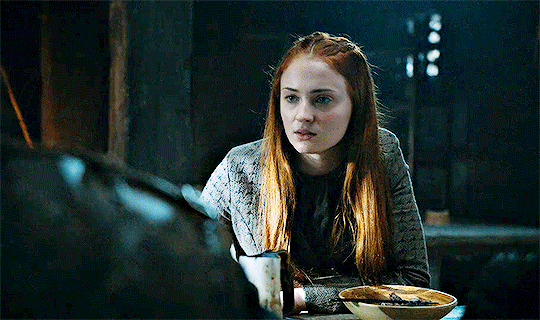
Time.
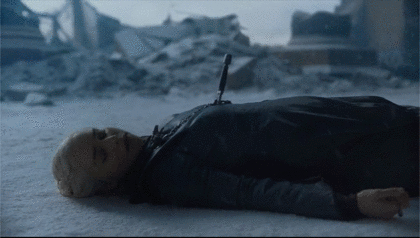
And the parallels between the gif above with Dany and the dagger to the Northern soldier that had Jon's sword run through him, and Jon's staring almost sadly at the man, realizing he had to kill one of his own are far from being coincidental.
Not only was this a precursor to what would occur in 8x06 (and why Jon would make the decision he did) but it also is symbolic of the dynamic between Jon and Sansa as a whole. She's the one who stirs him into action, no matter how terrified or traumatized or angry he might be in that moment (like the shock fugue). No matter how lost he might feel. She gives him direction and dare I say a purpose when he has none (after his death; after the WW are defeated & Dany has gone into tyrant mode).
No wonder we weren't allowed to see Sansa's (or Arya's) reaction to the news of his being a Targaryen.
No wonder Jon told Melisandre not to bring him back if he lost the Battle of the Bastards (after Sansa told him if he lost, she wouldn't be going back to Ramsay alive).
No wonder Jon was not happy with Sansa on the dock in 8x06.
She's always stirred him into action when he doesn't want to be or know how to do it himself (after his death).
He passed a woman he could have saved.
He passed a child he could have helped.
He saw someone on the other side helping and doing the right thing.
The only time he steps in to help someone else is the woman about to be assaulted.
(x) "You are the shield that guards the realms of men. You've always tried to do the right thing. No matter the cost. You've tried to protect people. Who's the greatest threat to the people now?" (no reaction)
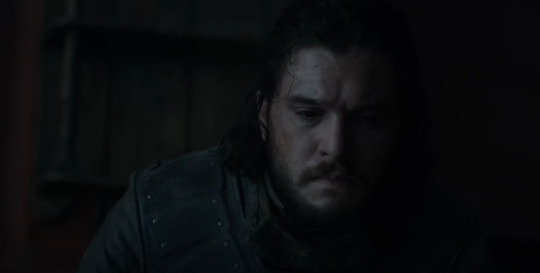
"Do you think I'm the last man she'll execute? Who is more dangerous than the rightful heir to the Iron Throne?" (no reaction)
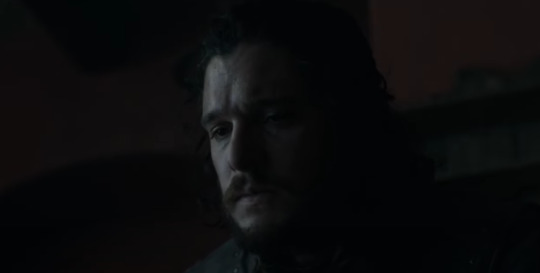
"And your sisters? Do you see them bending the knee?" (a little bit of a reaction)
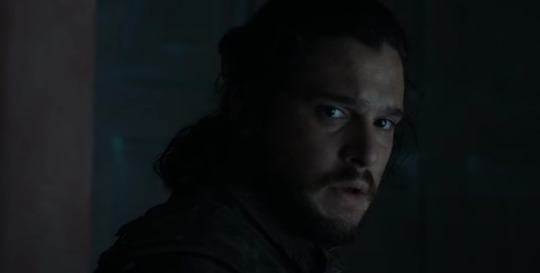
"Why do you think Sansa told me the truth about you? Because she doesn't want Dany to be queen." (more of a reaction)
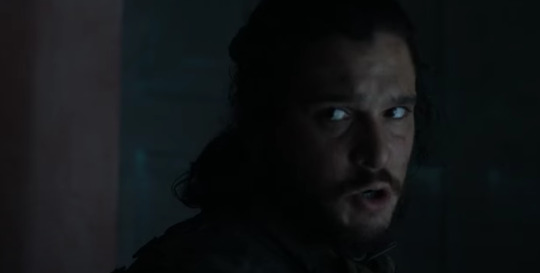
"No, but you do. And you have to choose now." (he hesitatingly goes to confront Dany and then 🗡️)
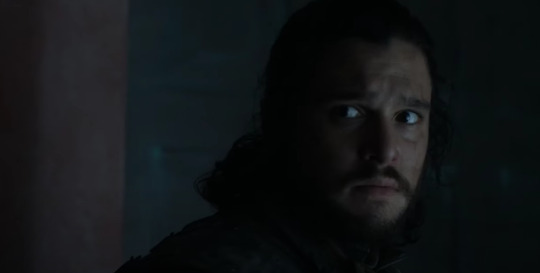
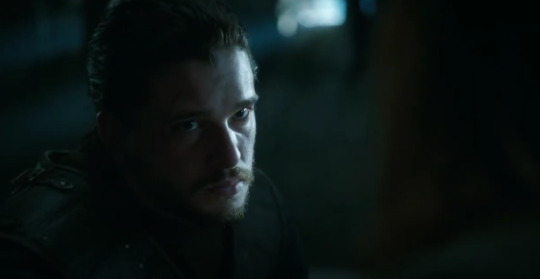
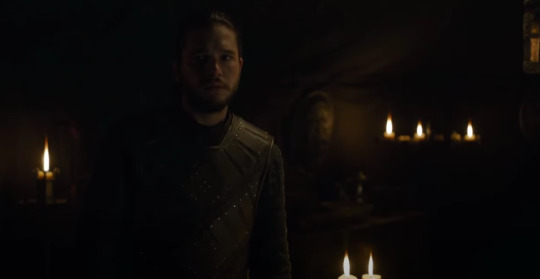
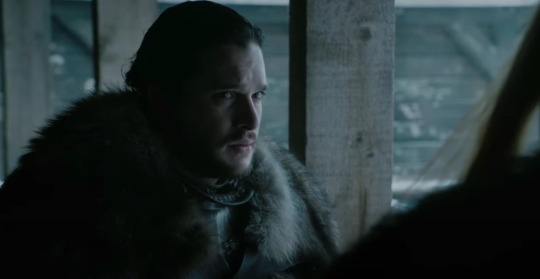
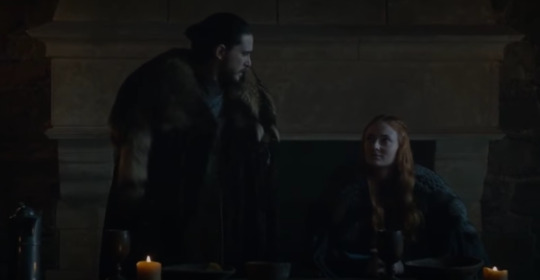
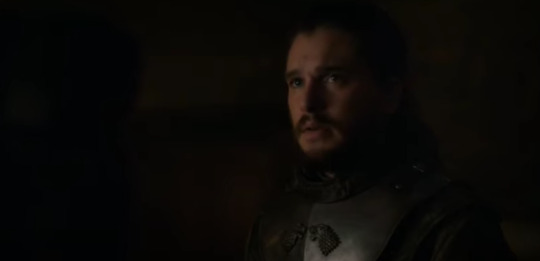
It's not just about her being his "sister" or because she's Lady Stark or family or because they were the last two Starks once upon a time. She literally stirs him into action and gives him purpose. Her pushing to go back to Winterfell led to him caring about the WW invasion again. Her being the one he chooses to protect ended a tyrant and changed history, leading for her to become the first Queen in the North and regain Northern Independence, where she can be forever safe.
It was always Sansa for him, starting in 6x04.
206 notes
·
View notes
Text
Is Hürrem & Suleyman's love as beautiful as it seems ?

While watching Magnificent Century, I've found that one of the most complex relationship in the show was the one of Suleyman and Hürrem themselves. In the context of sexual slavery, traumas and the Ottoman Empire their story is too complex to not analyze.
Hurrem arrives to the harem completely traumatized. She's shipped to this foreign land where all of the sudden she has no one and is no one. It's clear from there that her love for Suleyman is some sort of coping mechanism. This relationship allows her to survive and find some meaning in her life and that's the first problem, Suleyman becomes the center of her destroyed world.
That said, Suleyman really does show her some real affection, he listens to her, they laugh a lot and he immediately starts caring about her. Most importantly, he protects her when he learns she's been thrown in the donjons by Valide and for someone who's in such emotional turmoil that's everything.
But even with that, the foundations of their relationship is absolutely not healthy.

If Hürrem angers Suleyman, disobey or annoy him, or even if he just gets bored of her, she's finished. He can kill her, threatened her, torture her or just abandon her like he did to Mahidevran and her and her children's whole future are threatened. In those circumstances what kind of relationship is this ?
I won't even do more than mention the many times he had her exiled and separated from her children because he was angry at her, but I do want to mention the time he made her drink what she believed was poison to "test her". I was convinced when she woke up that it was going to be a point of non-return in their relationship, the moment she realizes how little choice and agency she had in this. I thought this would shake her delusion that this was love, but no. I blame the writing team for this one, it's doing the story a big disservice to never acknowledge how unbalanced Suleyman and Hürrem's relationship is.
This brings me to the question I've had in mind for a while. Since Suleyman is in many ways all the harem women's captor and master, does Hürrem suffer from Stockholm Syndrome ?
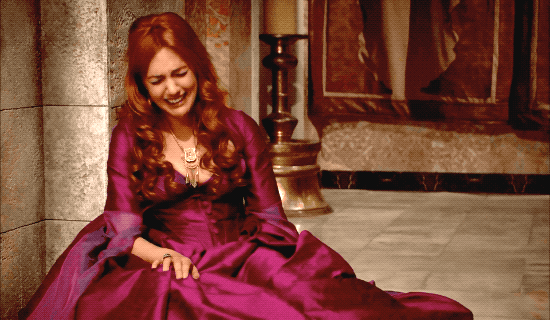
I've focused a lot on Hürrem up until this point, but even if Suleyman has the power life has messed him up just as well. His father tried to kill him, he becomes responsible for a whole Empire at the age of 26, the people in his life lies and sometimes even plays him, some wants his power all to themselves and there comes a point where he can never really know who to trust, who's not imagining his death so they can gain more power. As he grow older, he learns the downside of power in the harshest way, it prevents him to trust his loved one. It's horrible.
I think this is why Hürrem's loyalty was so important to him, because in many ways, no matter if it came from a fucked up place she was the only one who was there for him first and foremost. Yes, she enjoyed the power and played her own little games, but it was never against him.
Again, the issue here is that Suleyman's love seem to mostly come from massive trust issues he developed during his whole life, so how legitimate is it ?

Hürrem and Suleyman built a family together, they had children and grandchildren after that, they really started ruling together as they got older, discussed states affairs and compromised and after her death, he was never really quite the same.
But here where it gets really depressing, with all that said the question is not so much if there was affection between Hürrem and Suleyman or not (they clearly cared for each other) but more if what they thought was love was not just them not being able to give up this companionship in this lonely and miserable life they both led ?
And in many ways, isn't that what a lot of humans beings do, decide to stick together so they won't have to face this harsh life alone ?
In the end, is this what love truly is ?
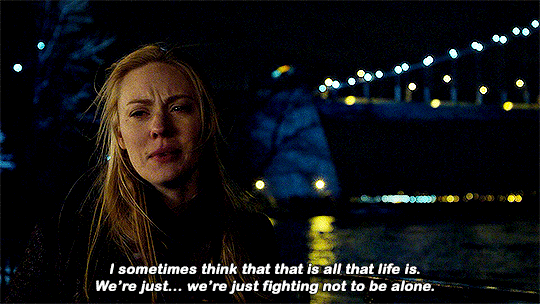
#magnificent century#muhteşem yüzyıl#hurrem sultan#sultan suleyman#I don't have all the answers this is just some late night deep thinking#Maybe also some thinking about what love really is and if it truly exists#I'm feeling existential tonight
41 notes
·
View notes
Text
girlhood for me and why it’s fucking cool and important: (kinda long)
so, girlhood for me is summoning demons at sleepovers, playing “runaway orphans” on the playground and becoming bloodthirsty mermaids in swimming pools. barbies getting messy divorces, shopkins engaging in cannabalism, stuffed animals fighting in wars.
girlhood for me is being evil and angry and creative and thoughtful and kind in ways that didn’t matter to most people and talkative about the wrong things in the wrong places in ways that isolated me from my peers and being wonderfully, violently, beautifully strange.
imagination running free cannot and should not always lead to cute, wholesome things that misguided adults percieve as acceptably docile play. yes, don’t hurt people, but if your idea of make-believe leaned a little bit more towards princesses riding on sparkly unicorns as they charged into battle, there is nothing wrong with that. i was a weird fucking kid. i would have full conversations with trees. pretend to be possessed to freak out babysitters. cry, laugh and scream at everything. i didn’t hurt people, and no one was scared of me, but i was made fun of a lot, and it really fucked with my sense of self and my perception of what staying true to yourself meant.
i had to unlearn that, am still unlearning that, and that shit’s fucking hard. btw, my experience as a girl is that of a cis, neurodivergent, able-bodied white lesbian with supportive, middle class parents, and all those things affected me and how people treated me and how i perceived the world and those inside of it.
girlhood for other people means other things. and that’s okay. some had stereotypically feminine childhoods, by choice or otherwise. some had a more masculine childhood, and may have been labeled a tomboy. and tons in-between had otherwise nuanced complexions within their own experiences as women. many people didn’t get to experience “girlhood” until they were of adult age, because they were raised under the impression that they weren’t a girl. many people do not associate girlhood with positivity, because their experience as a woman, or their childhood in general, was very debilitating or traumatizing for them. many people experienced girlhood only to one day realize that they were not female at all, or that their gender otherwise held more need for introspective thought that they originally had guessed.
my point is that “girlhood” holds nuance. it means different things for different people, and it is beautiful, and you are beautiful, either way. and if it hurt you, fucked you up, entangled you in things you’re still escaping from, you are valid in however you process that. you aren’t being dramatic, or being ungrateful, or not “letting bygones be bygones.” childhood sucks sometimes, and you are entitled to the anger you feel. we weren’t allowed to pass down our last names, so we passed down our fury instead, and it is wiser and wilder than our oppressors, or their namesakes. it made us, and allowed us to make ourselves. it is beautiful, and brilliant, and tortured in it’s glories and raptures, and so are we.
#i hope this was therapeutic to someone#also:#my “is my anger mine or my mother’s and so forth” sentiment is NOT trans exclusive#love u guys#this was an empty train of thought#but the message is that girlhood is cool and complex and ur valid in how you perceive it#kind of lost my train of thought but whatever#girlhood#feminism#just girly things#good for her#female rage#female righteous anger#terfs dni#wlw#trans-inclusive#will add more later if i think of it but these tags are already monstrous#hope i made someone feel good#we’re really cool u guys and we’ve gone through lots of shit
2 notes
·
View notes
Text
Coping with Betrayal: Overcoming Depression After Your Husband Cheated
Betrayal in a marriage can shatter the very foundation of trust and security, leaving behind a trail of emotional devastation. For many women, discovering that their husband has cheated is a traumatic experience that can trigger feelings of profound sadness, anger, and despair. If you find yourself struggling to cope with Depressed after your husband cheated, know that you are not alone. With the right support and resources, it is possible to heal and rebuild your life.
Depressed After Your Husband Cheated: Understanding Your Emotions
The discovery of a partner's infidelity can unleash a tidal wave of emotions, ranging from shock and disbelief to intense sadness and anger. It's important to recognize that these feelings are a natural response to betrayal and do not define your worth as a person. Allow yourself to grieve the loss of trust and the shattered dreams of a happy marriage. It's okay to feel angry, hurt, and even numb at times. Give yourself permission to experience and process your emotions without judgment.
Seeking Support: Reaching Out for Help
Coping with Depressed after your husband cheated can feel overwhelming, but you don't have to navigate this journey alone. Reach out to trusted friends, family members, or a therapist who can offer support and guidance during this challenging time. Talking about your feelings with someone you trust can provide validation, comfort, and perspective. A therapist can also help you develop coping strategies and resilience skills to navigate the ups and downs of healing from betrayal.
Taking Care of Yourself: Prioritizing Self-Care
During times of emotional turmoil, it's crucial to prioritize self-care and nurture your physical, emotional, and mental well-being. Engage in activities that bring you joy and comfort, whether it's spending time outdoors, practicing yoga, or indulging in a favorite hobby. Eat nutritious foods, prioritize sleep, and avoid self-medicating with drugs or alcohol. Establishing a routine and setting small, achievable goals can provide structure and a sense of control during times of uncertainty.
Processing Your Feelings: Journaling as a Therapeutic Tool
Journaling can be a powerful tool for processing your emotions and gaining clarity during times of emotional upheaval. Set aside time each day to write down your thoughts, feelings, and reflections on your journey of healing. Use your journal as a safe space to express yourself freely without fear of judgment or criticism. Writing can help you gain insights into your emotions, identify patterns of thinking, and track your progress over time.
Seeking Closure: Confronting the Truth
As you navigate the healing process, you may find yourself grappling with unanswered questions and lingering doubts about your husband's infidelity. While closure may be elusive, it's important to confront the truth and seek clarity on the circumstances surrounding the betrayal. Consider having an honest conversation with your husband about his actions, expressing your feelings, and seeking closure on your terms. Keep in mind that closure is a personal journey and may look different for everyone.
Rebuilding Trust: Healing the Wounds of Betrayal
Rebuilding trust after infidelity is a gradual and challenging process that requires commitment, honesty, and patience from both partners. If you choose to work on your marriage, seek couples therapy to address underlying issues, improve communication, and rebuild intimacy. Establishing healthy boundaries, practicing forgiveness, and cultivating empathy are essential steps towards healing the wounds of betrayal and restoring trust in your relationship.
Moving Forward: Embracing a New Beginning
While the pain of betrayal may never fully disappear, it is possible to find healing, growth, and even happiness after infidelity. Embrace the opportunity for self-discovery and personal growth that comes with overcoming adversity. Focus on rebuilding your sense of self-worth, rediscovering your passions and interests, and creating a life that aligns with your values and aspirations. Remember that you are deserving of love, respect, and happiness, and that brighter days lie ahead on your journey towards healing and renewal.
0 notes
Text
okay i’m not trying to start drama. but. discourse about the Steph and Cass relationship concerns me a bit.
mind you, it’s totally valid to critique certain aspects of it - like how its served to undermine either character’s individuality with the wrong writers (particularly Cass). i do want more non-ensemble stories featuring them.
but i feel like more and more i’m seeing the “solution” to these problems as people wanting Steph and Cass to not be as big a factor in each other’s lives as they are. which is like, blatantly discounting the long history of their friendship, and just how deep and meaningful it is for both of them.
Cass and Steph have an intrinsic connection via their traumatic pasts, of which they’ve strived to not let define them, and committed toward the fight against injustice. and that desire to forge their own identities does, in some way, seem to come more easily to them when they’re together. they both know how hard it is and have been shown as relentlessly supportive of each other’s journeys because of it. to say their friendship is actually reductive of their individual identities in-universe is very much just fandom discourse clouding actual canon. Cass and Steph do not feel stifled by their commitment to one another.
also, they just generally enjoy each other’s company?? and that’s okay??
one argument i can’t stand is the idea that Steph and Cass shouldn’t be THAT good of friends, that they would almost certainly get angry with each other consistently, that they wouldn’t have good communication skills (not even gonna get into how ableist that is), etc.
now. i’m all for relationship drama - and yeah, i’d be up to see some more of it in regards to Steph and Cass. but claiming they simply cannot be allowed to have such an ease and comfort with one another as is portrayed in the interest of said drama is SO weird.
if i were to try to understand where it comes from - i do know there’s some level of backlash to the modern push for “women uplifting women”, out of concern that it’s washing away a lot of the nuance female friendships have.
as to how much that applies to Steph and Cass...i don’t know. even in Batgirls (which is just way lighter in tone overall) Steph and Cass aren’t this perfectly well oiled machine. just the other issue we saw Steph reject Cass’s words of encouragement because she’s convinced everyone secretly doubts her abilities. WFA just had this great little two-parter about how Cass hates how conscious she is of everyone’s emotions and how that hyper-awareness can cause problems with Steph. but i digress-
even if it IS the case, to feel it’s indicative of “women uplifting women” being a flawed portrayal of female friendships (or at least Steph and Cass’s) in the first place is so reductive. it feels like just another reflection of the patriarchal idea that the dynamics between girls are somehow inherently more toxic and catty than those of males.
i can’t tell you how many times i’ve had a man tell me guys are just “more chill” with each other than girls are.
or how much media i’ve seen surrounding female characters that covet being “one of the guys” on account of how much more comfortable they are with their unproblematic, non-gossipy guy friends (usually in romance plots actually, as if it couldn’t be more obvious this is just male writers trying to project some level of desirability upon themselves. which is just a beautiful self-own, because - no, male-female friendships can be way more uncomfortable, especially when your male friends are constantly trying to categorize you as a potential fucking love interest).
and, yeah, how much do you see this conversation applied to Tim and Kon? Or Jason and Roy?
of course, i don’t want to discount the fact that patriarchal norms have led to a culture where female friendships can be that way. but that’s just it - it’s down to patriarchal norms. and i know for a fact that the strength of female friendships can shed those norms. and i almost certainly abide by the fact that Steph and Cass would have no problem doing that.
and either way, female friendships in general ARE shedding those norms from an earlier age. i can attest to the environment of my HS experience being much less “mean girls” and much more “turning red” (which didn’t take place in HS but w/e you get my point) (and not to say that mean girls was ever meant to be wholly accurate mind you lmao).
soooo yeah. we can ask for more individual stories between them without actively rewriting how much the two care and connect with one another. Steph and Cass are still each other’s best friends.
but that’s just my take. i guess this kinda became a rant lmao.
also i’m not gonna get started on how many ppl are so quick to discount the queer reading of Steph & Cass bc that’s genuinely annoying
68 notes
·
View notes
Text
Even with the recent speech Uraraka gave, let's please remember that Horikoshi tends to treat his female characters poorly.
Nejire deserves a better arc, something as deep and wonderful as the one with Mirio and Tamaki.
Midnight deserves to be more than a sex symbol, she deserved to be involved in the Kurogiri situation, she deserved to be a role model for her students.
Mirko is one of the best pro-heroes out there and she deserved more than a quick arc and being thrown away.
Lady Nagant has amazing backstory that could help a lot with the narrative of the UA kids learning that villains are humans that deserve to be protected to and that big corporations and the government when they are corrupted are worst than any villain.
Curious deserved to live and fight.
Momo deserves a proper suit and she deserved a better internship.
Kendo deserved a better internship too.
Recovery Girl was the one fighting the most against people pushing the UA kids and making them grow up faster. Those were kids, no weapons.
Rei Todoroki is a victim and a heavily traumatized woman that is also very complex and not the perfect housewife and she deserves to be angry and show her mental condition and deal with the things she did.
Fuyumi doesn't have to have a flashy quirk and be badass or something to be valid. She deserves to deal with her trauma the way she sees fit.
Tsuyu is allowed to don't want to redeem certain villains because Toga attacked her, Dabi almost killed them, she was seconds away from being decayed by Tomura, she doesn't have to forgive anyone.
And more. Good representation doesn't mean only having women who are strong and badass and– NO, representation means showing all type of complicated women, bitchy women, naive women, women who wants to get married, women who hates love, women who only want fame and money, women who wants to be housewives, women who are evil and nasty, women who believe in changing the world and doing what's right.
They shouldn't be used only to further a male character development. They deserve their own arcs, to play big roles, to have a real impact on the worldbuilding, etc. They deserve suits that are practical and not just for sexual fantasies.
#Shan's mha opinions#Shan's bnha opinions#mha#bnha#my hero academia#boku no hero academia#league of villains#lov#Mha women#Bnha women#Nejire Hado#Curious#Rei Todoroki#Fuyumi Todoroki#Midnight#kayama nemuri#rumi usagiyama#Mirko#Lady Nagant
312 notes
·
View notes
Text
a while ago i saw this post dismissing jack's growth in me3 as "bioware forcing her to play mommy to a bunch of kids" and it's been probably two or three weeks now since i saw it but thinking about it again i'm still steamed at how badly that person seems to have misunderstood her arc. like yes, obviously there are valid criticisms to be made re: how character arcs for women so often involve them becoming more protective or "maternal" as an apparent sign of growth and maturity, even when it doesn't make any sense for the character. but i personally don't think jack's arc is really an example of this problem, i think her becoming a teacher and caring about her students makes a lot of sense in the context of her character development and it's probably one of my favorite pieces of writing in the entire series?
because like. meeting her in me2 and seeing this angry, traumatized person whose experiences have forced her to solve problems with violence and trust no one, and always kill the other person before they can get the chance to kill her? who feels that she's alone in the galaxy and can only rely on herself, because pretty much no one has ever cared for her or tried to help her without ulterior motives (and the one important time where someone did, which she tells you about in her romance, ended in his death and reinforced her feelings that letting people get close was a mistake)? jack in me2 starts out so emotionally isolated and constantly on guard, having learned from past experiences that this is the only way to protect herself. and over the course of the game, as she learns that shepard is someone she can trust (and also probably bonds with some of the other squadmates but that's more of a headcanon because bioware didn't let any of the me2 squadmates fucking talk to each other lmao), she starts to realize that maybe there are people in the galaxy worth trusting, and maybe keeping everyone at a distance to avoid being hurt just results in a different kind of hurt, and letting people in and letting herself care and be cared about in return might be worth the risk.
and then seeing her in me3 and finding that she's become a teacher to a bunch of biotic teenagers? it might seem weird or ooc at first glance, but considering how jack spent most of her life fending for herself, thinking that she couldn't rely on or get close to anyone, is it so much of a stretch that she could see these kids, full of biotic power that they don't know how to control, and want to help them? she knows from personal experience that the galaxy can be a horrible fucking place, and it makes sense that after learning to let people in, the next step for her character arc would be to see these young people potentially in danger of being exploited for their abilities like she was, and make sure no one had the opportunity to hurt them like people hurt her. it's about her, after learning in me2 that there are good people out there who are willing to protect others, also realizing that she herself has the potential to be that person for those who need it. her horrible experiences and the things she's done because of them don't change the fact that she's capable of doing good and caring so, so much when she allows herself to, and she can teach this group of snarky teenagers and give them guidance and support.
and like, she's still the same character! she's the same jack we knew from me2; she still swears like a sailor, makes lewd jokes, throws some barbs at shepard and quite a few at her students too. she's the same character, she's just healthier now, she's found constructive ways to begin to heal from her experiences instead of just throwing enemies around like ragdolls with her biotics. but like, she still does that too!! and the rapport she has with her students is fun to watch, she ribs them and gives them grief and they throw it right back at her, and through all these playful insults it's so clear that she just really wants them to succeed and be safe. she cares about them a lot, but the way she shows it is still very her. jack growing to care for her students wasn't bioware turning her into a different character or, as that person put it, "forcing her to play mommy." she's still a foul-mouthed badass who loves to fight, she's just in a better place emotionally and has found people she's willing to fight to protect.
i've made a few posts before about how there's this constant theme in mass effect about making things better for the people who come next, about taking what's happened to you and letting it give you the strength and conviction to protect other people from going through the things you did, and god i really do think jack's arc is one of the best examples of this in the entire series. and not to get too personal but speaking as someone with a lot of trauma who has also felt isolated for most of my life, it makes me happy to see a character whose process of healing so heavily involves surrounding herself with people she cares about, because that's something that's been so important to my own healing process so far.
anyway i love jack masseffect and her arc is well-written and important and i don't know what that person was on about
12 notes
·
View notes
Text
10 Reasons Why Carrie Bradshaw Wasn’t THAT Bad...
Sex and the City is the most elite series I’ve ever watched - and I was so excited to purchase the first season when I turned 18.
I would listen to my mom and my sister gossip about the show when I was younger and feel so left out. But, my mom would refuse to let me watch it until I became an adult. Thank god.
Being an avid fan now, I sometimes scan through Sex and the City articles on the net, and can’t help but notice dozens of articles filled with ‘Carrie’ slander - which kind of makes me nervous.
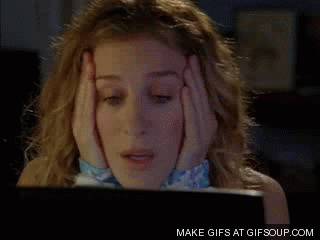
Although it was true that years ago girls were labeling themselves as the ‘Carrie’, ‘Samantha’ and ‘Charlotte’ of the group - the serious and less glamorous friend got stuck with being a ‘Miranda’; it is kind of an insult now to be deemed as a Carrie.
As we all matured, we realized that being a Miranda is amazing and we should all strive to be just as successful - but Carrie Bradshaw is still a valid character and I’m here to prove why the “sexual anthropologist” is not all that bad.
Now before I dive into why I totally get Carrie Bradshaw, I would just like to point out before hand that I am aware that she is just a fictional character and hopefully you are too. If you are not informed, then I apologize for this harsh revelation. However, let’s continue.
1. She was average looking
While we can all agree that her physique only gets stronger and leaner throughout the series, she was still not exactly perfect looking. Despite her fit body, she was not model like or necessarily tall. She did not have a perfect nose. She did not have the biggest ‘lady parts’. She did not have the plumiest lips. She did not have perfect facial symmetry.
But, she was okay with it. And has mentioned that by the age of 30, she was over being uncomfortable with her looks and decided to move on.

Despite constantly bumping into models and having to accept that men can be total “modelizers” - especially in the capital of the world aka manhattan, she chose to embrace her natural beauty, which in turn has allowed her to walk the runway in her underwear.

2. She was selfish
Yes, the new trend is to be selfish and say no - because that is ‘self love’.
If that truly is the case, then there was no denying then that Carrie was selfish throughout the series.
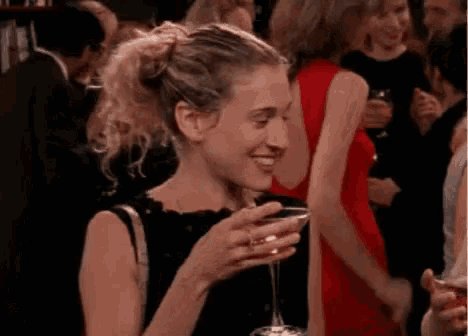
As human beings, we are selfish by nature. But since we now identify ourselves in societies with expected norms and values, being selfish disqualifies you sometimes from your environment. To avoid being lonely, we try to let go of being selfish or at least hide our selfish traits.
Unfruitfully so, our selfish instincts at times fail us - exposing our true colors. And whenever that happens, people aren’t too afraid of pointing out what you did wrong. It doesn’t make us necessarily evil, just makes us human.
To avoid being Freudian in this post, let’s just sum up that Carrie is harmlessly selfish at times - that includes being late to every event, asking her friend Susan Sharon if she could trade in her cashmere sweater birthday gift for cash, accepting a pair of 600$ shoes from her other super rich friend, and cutting off Charlotte’s possible infertility problem discussion to talk about her Manolos.

The list goes on, I mean - this is just classic Bradshaw behavior. However, this character cannot be deemed as bad. She was just under the spotlight, and if we were under it too, we would find out that we do have these moments as well without realizing it. We are not perfect. However, Carrie does reflect on her mistakes often, which is something we should be doing more.
Sometimes, her selfish tendencies can really get out of hand.
It was not okay when she got angry at Charlotte who did not offer to lend her money after she blew it all off on Manolo Blahnik shoes instead of rent. It was not okay when she threw away Aiden down the drain. It was not okay when she slept with a married man, even if it was ‘Mr. Big’.
We cannot shame her though because we all have hidden skeletons in our closets...it’s up to you however to peak in and see which faults make it or break it for you.
3. She was a working woman
No offense to chastity ball princess Charlotte, who wanted to be a housewife to any rich man who crossed path with her, Carrie Bradshaw was by all means an ‘all star’ business woman. Despite being unconventional unlike Samantha Jones (PR executive) and Miranda Hobbes (Harvard-graduate Lawyer), Carrie Bradshaw was a restless woman that worked in multiple fields all at once despite being so undermined.
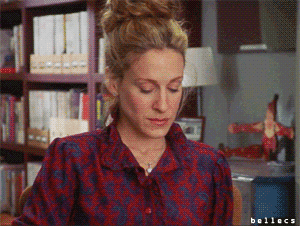
She had so many tasks to tackle all at once while juggling multiple projects. She ran around between the fields of Journalism, Content Marketing and Public Relations. She was able to get invited into all the ‘fabulous’ events and meetings because of the hard work she invested in all by herself as a freelancer who lived in a huge place like New York. Carrie finally reached her goal at the age of 40, which was working at Vogue. She even wrote multiple books as well.

4. She was unconventional
Despite the show running in the early 90s, Carrie Bradshaw decided to be a sex columnist. She never gave up on her weird unconventional job and was proud of her career despite the looks or comments people would make. She had a weird exterior in addition to how upfront she was about the physical makings of life.

In addition, Carrie did not believe in marriage until she became a fiancée at the age of 40. She traded in a ring for a pair of shoes and a walk-in closet, unlike most women, who would rather get married in their mid 20 to early 30s with a huge rock on their finger.
5. She was struggling at adulting
Carrie Bradshaw had a deluded concept of adulting that at least most of us had or still struggle with. She was not a healthy adult with financial stability and a well thought out regime. However, she still managed to be fabulous.

She had poor dieting habits, which made her sometimes skip dinner to buy Vogue instead. She believed that shopping and gossiping were the best types of cardio. She was not the cleanest and had a messy apartment at most times. She did not care about the way her living space looked like, which she later on freaked out about in fear of being judged as an imperfect adult according to Mr Big. She paid so much on shoes that she could no longer afford her rent. She believed that investments must be seen in her closet. She drank at least six dollars worth of coffee per day. She would smoke and drink way too much for a thirty year old woman.
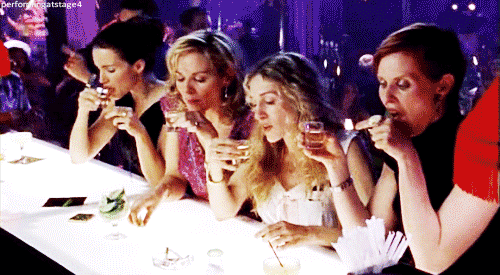
6. She was a good friend
Carrie Bradshaw had so many friends that it almost put her PR bestie Samantha to shame. To be honest, Carrie may have not been a perfect friend, but she was as good as it gets realistically.
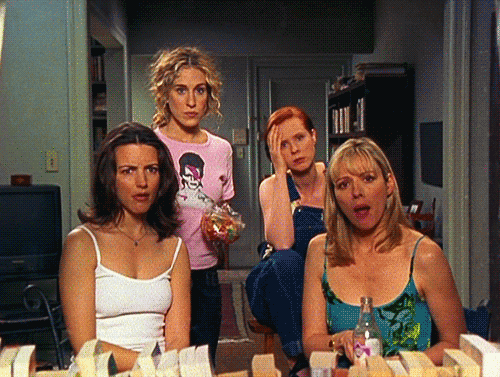
What made her so realistic in her friendships was her ability to be there for most of her friends’ hardships. She had her ups and downs with her empowered female group because sometimes they would feel like she was too problematic and vice versa. For the most part, it is impossible to be as passionate to your friends as you once were the first time you guys met. But what makes a friend a good one is that they never voluntarily try to find excuses to leave you behind.
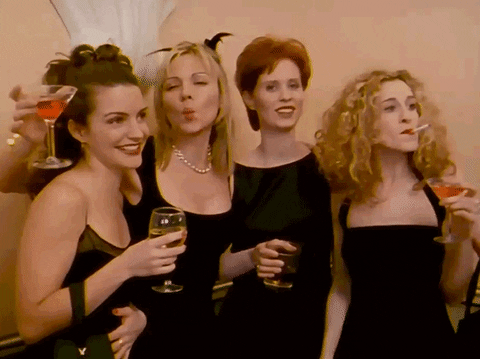
Carrie’s love towards her friends in her good and bad times showed that she valued them like family.
7. She was lost
Carrie was probably more lost than she would have liked to be. She had a tendency to dwell on what should have been and could have been. We all have regrets and sometimes she voiced hers out more than other characters within the show. She would sometimes yearn over the years that passed by her. She even went to extremes such as dating a college boy just to remember what it was like to ‘just kiss’. Rookie Mistake, Carrie.
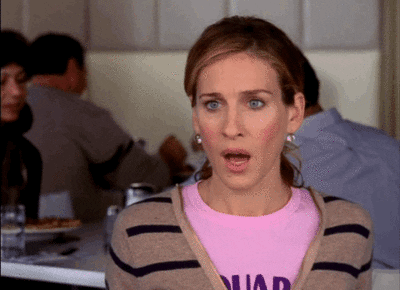
Just like Carrie, as time goes by at any age, we look back at the spur of events that created our timeline and take note sometimes of which events we deem as either life-changing, traumatizing or both.
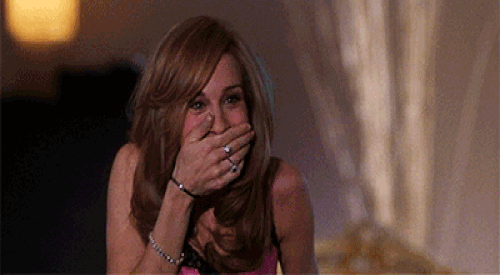
8. She was experimental
She may not have been as promiscuous as her friend Samantha, but she was unarguably adventurous in all aspects of her life. Although the most obvious aspect may have been her outfits, her wild colors and funny textural accessories were just a preview on how eccentric Carrie Bradshaw truly was. She mentioned that her younger years were a genuine pursuit of fun in every shape or form, which most twenty-something-year-olds cannot deny.

She emphasized that she fears living life as a cautious person because of the hurt she has endured. However, she truly defined throughout the show what it means to be eccentric, empowering the ones who fail the experiments of life to get back on their feet.
9. She was flawed
Carrie Bradshaw believed in the glass half full rather than half empty throughout the series. Despite being unbearably flawed to the point where her friends no longer wanted to listen to her problems, she decided to see a shrink which is something that would have been especially socially-unacceptable in the 90s. Carrie still overcame her mental issues and found other remedies which in turn has led her into accepting the way things played out.

As we grow up, we, like Carrie, need a little bit of help in order to realize that temporary issues will fade away into lessons and the permanent ones that are out of our control can be accessorized into our lives accordingly to the way that we want it to look like.
10. She was in love
Her love towards Mr Big was illogical - almost completely insane. But what made her character so special was the fact that she never continued her relationship with Aiden because she knew deep down that it was Mr Big all along and never gave up on it; despite all the signs that kept telling her that he was bad for her. He was at the time indeed bad news, which made her feelings towards him fluctuate between love and hate.
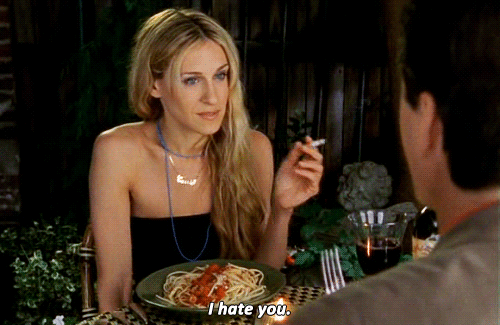
Now, the psychology behind her and Mr Big does not justify why you should call your ex right now so put your phone down, but it is something to think about.

Carrie took the road not taken for most women, especially during the 90s where gender roles in love where still a bit rigid. While it is true that it is always easier to date lovers who make the effort to chase you rather than pursuing it yourself, the easiness does not create the ‘fairytale love’ that most of us strive for.
Carrie once described her love towards him as a crash rather than a crush. But if something deep down is telling you that someone is your person, shouldn’t that account for something? Shouldn’t we all just go for ‘ ridiculous, inconvenient, time-consuming can’t-live-without-each-other love’, and get it right just like she did?
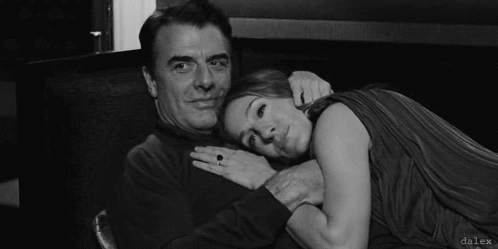
- Nina xx (yasminasayyid)
#carrie bradshaw#Sarah jessica Parker#satc#sex and the city#sex and the city 2#Samantha jones#Miranda hobbes#quotes#mr big#Charlotte york#chris north#Cynthia Nixon#kim cattrall#kristin davis#new york#Manhattan#new york city#vogue#cosmopolitan#beauty#buzzfeed#betches#media#psychology#content marketing
56 notes
·
View notes
Text
In defense of Daenerys' spiral into madness
I see a lot of people upset and disappointed in Daenerys' ending last night not because they stan her blindly and want her to be the badass queen, but (rightfully) because they believe this sets a dangerous, mysoginystic precedent that teaches us no woman can be powerful or strive to be powerful without it blowing up in her face. It kind of reads as a cautionary tale that says women in places of absolute power, of agency and control, will eventually go insane because well, they're women. I have also read it interpreted as saying that the only possible ending for a woman who has been abused, raped, sold into slavery, and tossed to the side is for her to go insane. Because trauma damages the inherent worth of women, apparently.
these are all valid concerns, because d&d are not known for being the most capable writers and to be honest, this ending WAS tinged with mysoginy and poorly executed. but if these concerns are true for you, then yall should turn to Sansa Stark.
Sansa is the proof that this show doesn't always shit on women. If you really think in this show a woman that's been through hell and back is cursed by the writers to have a trauma porn ending, then look at Sansa and realize that SHE is the direct parallel to Daenerys, with a completely opposite outcome.
She has been traumatized
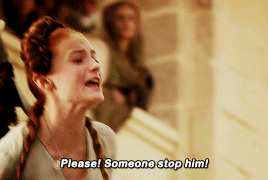
She has been abused

and married against her will
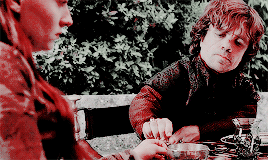
She has been beaten and sold off like cattle

she has been manipulated
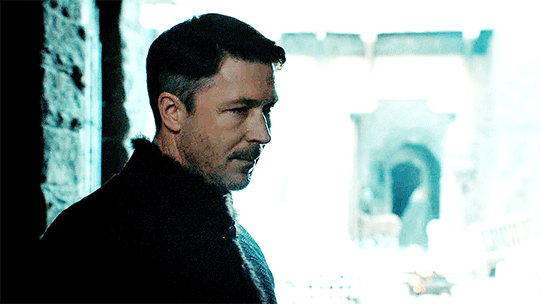
She has been raped.

And yet, she has come out the other end a good person, a brilliant strategist and a dedicated Queen. She vows to always defend her people, and she has shown resilience at every turn of the story.
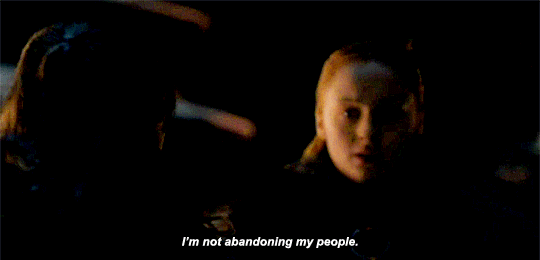
She hasn't come out unscathed, but she is proof women who are traumatized do not always become evil, or go insane or start abusing their power.
She has a lot of power, as Lady of Winterfell, as the last hope for the North, as the link with the Tullys of her family. She used to be a spoiled child who dreamt of becoming Queen, but now that she's seen what power can do to people she no longer wishes to be Queen for the sake of being Queen. She wants to be the leader of her House, and to protect the people that have pledged to defend her and her family because that's what a kind leader does. She's stared cruelty dead in the face and has chosen to respond "I will answer cruelty with mercy."
If that means becoming Queen, then so be it. She doesn't claim to be the leader all people want and cheer, she just wants to see justice be served and keep the North safe.
Want more examples of women not getting corrupted by their past? Take a look at Arya.

At Brienne

At Yara Greyjoy

All these, powerful women that have suffered at the expense of men and of other people who wish to see them fail. All with similar backgrounds to Daenerys'. And yet, they have not turned out to be mad. Because power IS corruptible, specially when it's the only end and the only mean you seek. Which is what Daenerys did.
But do not pretend that her ending was something made purely out of spite and hatred for powerful women, because it isn't. Daenerys had a lot of opportunities to turn the other way, to realize with great power such as the one the dragons gave her, you need to be held accountable and you need to be responsible for that power. D&D are not the great writers they believe by any means, and all the female characters have suffered at their expense because they do not know or do not care about how to write women. But not everything is black and white, and some of the most important and iconic characters in the show ARE women. Women who do not go fucking batshit crazy when things have not gone the way they planned.
So yeah, if you're angry about Daenerys' ending, that's valid and you are allowed to grieve the characters you love. But you need to face the truth and accept that not everything you don't agree with about a story comes from a place of bigotry or mysoginy. Daenerys was always going to end up like her father. Not because she's a woman with power, but because she only cared about the power her name brought her, and what that could get her. Delusions of grandeur always come at great expense. If you want to turn this mysoginystic views around, then support Sansa Stark, and support Arya and their ending, because they are strong women who will live to see the end of the game of thrones.
#got#game of thrones#anti dany stans#but not anti daenery/s bc being a villain is not a bad thing in literature#we need female villains and we need to have them be more fleshed out#sansa stark#arya stark#got meta#got s8
827 notes
·
View notes
Note
I love Jon and Sansa's not so sibling relationship and I love Theon and Yara's sibling relationship. I'm sure there are connections between the two. Can you list the ways in which they are foils? Thank you!
Hey, nonnie!
Sorry for taking so long to answer this. I’ve had to spend some time thinking about how I was going to tackle it because I’m not sure I’m quite the right person to answer this question.
My main issue is that I don’t particularly like Yara as a character and I’m not all together happy with the way the show has handled the Yara/Theon relationship.
So, please ignore me while I go on a rant about my issues with Yara and then I will go on to attempt to draw a few parallel/foil examples between Theon/Yara and Jonsa.
I have a pretty hard time talking about Yara because in theory she’s a great character: she looks and acts badass but is still emotional and invested in the well-being of the people she cares about, she’s funny and charming and Gemma Whelan is a wonderful actress who looks and acts the part. However, that’s the theory and the actress.
My problem with her is that in narrative terms, she’s very much a character that talks the talk but doesn’t walk the walk. If this was an in-story flaw, I’d have no problems with it but it isn’t. This is the writers wanting to have a badass female character but also not wanting her to overpower the male characters in the show.
I’ll give you a few examples:
Yara coming to rescue Theon from Ramsay
I absolutely loved Yara standing up to her father, calling him a coward and saying she was going to save “her little brother”. However, she ends up at the Dreadfort and runs away the moment a shirtless man and his dogs scream at her. There was so much emotional build-up to that scene for it to fizzle out because the writers wanted to protect Ramsay not just from death, but from any significant injury/consequence.
Yara’s pitch for the Salt Throne
Since her introduction, Yara has been presented as the real reaver in this story. Tough, able, brave, knowledgeable, we were lead to believe people whole heartily supported her and even more importantly that she knew exactly how to talk to these people and what she needed to do for them. Then Yara makes her pitch as queen and all of a sudden not only do people point to Theon as a better option because he’s male (even though they scorned him when he first showed up on the Iron Islands) but end up very quickly turning on her and picking Euron, a guy they haven’t seen in years, over her. But that’s not even the most egregious thing. We could always chalk that up to male privilege.
The real issue is that when Yara makes her speech, she says very little of any real substance and then the moment she’s challenged, she becomes flustered. It’s up to Theon to make the salient points she should have made and then the writers give the truly revolutionary ideas to Euron who wants to develop and raise the Iron Born past the level of thugs they’ve been stuck in for centuries.
Euron’s attack on the Blackwater
Yara is supposed to be a battle hardened naval commander but Euron manages to surprise her and defeat her with little to no effort. I don’t have an issue with Yara losing the battle but the entire set-up shows her as being incompetent because not only didn’t she think there was a chance they’d get attacked, she didn’t take any precautions in the likelihood that it would happen.
Then there’s the Yara/Theon relationship and the two issues I have with that. :))) (Hang in there, nonnie! We’re almost done)
Yara’s sexuality and how that is used to shame Theon for not having a dick
Notice how almost all of the Yara/Theon scenes post-castration take place in brothels or situations where a woman is hitting on Yara? Don’t get me wrong. There’s absolutely nothing wrong with the show celebrating and highlighting Yara’s love for women. However, that’s not really what they’re doing. They’re essentially using those moments for cringe comedy and as humiliation for the fact that Theon’s not able to partake because … he doesn’t have a dick! Get it?!? Look how sad he is! Get it?!?
Nor is this the show trying to have a commentary on the issue of Theon’s castration trauma (which would be great but alas) but rather this is a narrative punishment/joke. And I don’t really appreciate that.
And then there’s this:
Yara: Listen to me. If you’re so broken that there’s no coming back, take a knife and cut your wrists. End it. But if you’re staying, Theon, I need you. We’re going to sail to Mereen. We’re going to make a pact with this dragon queen and we’re going to take back the Iron Islands. Are you with me?
If this was a singular case in this series, I would chalk it up to Yara being callous and ignorant about the profound and lasting effects torture and PTSD have on a person. But Brienne gave Jaime a similar “tough talk” when she disapproved of him being depressed over having lost his hand.
Brienne: Coward. One misfortune and you’re giving up? […] You have a taste of the real world, where people have important things taken from them and you whine and cry and quit. You sound like a bloody woman!
The message seems to be that all you need to get over trauma is a tough as nails badass woman screaming at you. Add some good ol’ fashion misogyny on top of it for good measure and you’re good to go.
Had your hand amputated? Stop “whining”! Still unsure how to get passed systematic torture and castration? Either put a band aid on it or kill yourself, we’ve got important shit to do. Can’t possibly waste any time on empathy, understanding and emotional support.
Again, I can’t really blame Yara or Brienne for that matter. This is the writers thinking that anyone who becomes a victim and doesn’t move past it as fast as humanly possible and also “toughens up”, is inherently weak. I hate that mindset and I hate the old “other people have it worse” argument. Yes, I’m sure other people have it worse. That is no reason to dismiss individual pain and how traumatic events in our lives affect us personally.
Now that’s out of the way, let’s look at a few instances where Theon/Yara act like foils to Jonsa. These will be broad because I don’t think these two relationships are set-up in opposition to each other, the way Jaime/Cersei and Jonsa are:
The relationship dynamic and roles
Yara and Theon are very much a relationship that operates under the clear hierarchy of big sister/little brother. This was established the moment Yara was revealed as his sister and continues to this day. In the beginning this was highlighted by Yara making fun of Theon, proving she’s better than him but also giving him heartfelt advice at Winterfell and bonding with him over having a shitty father. It was carried over into Yara protecting or rather trying to protect Theon.
Post-Ramsay, Yara is the leader that drags Theon after her. This inequality is further supported by Theon giving his claim to the Salt Throne in order to continue having a relationship with Yara. So in addition to being big sister/little brother, they’re also queen/right hand of the queen.
These established roles are completely missing from Jon and Sansa’s relationship and, in many ways, this is the true source of their disagreements and tension. What are they? Are they big brother/little sister? Are they true born/bastard? Are they King in the North/right hand to the king? None really fit … Jon doesn’t submit to Sansa’s authority and she doesn’t submit to his. The only way their relationship works is if they behave as equals. Anything less, I think would be unacceptable for either one of them.
Not only that, but rather than enforce an hierarchy, Jon and Sansa spend their time validating each other:
Jon: We’re standing here because of you. I’ve had the Lord’s chamber prepared for you.
Sansa: Mother and father’s room? You should have it.
Jon: I’m not a Stark.
Sansa: You are to me.
Sansa: You’re good at this, you know. Ruling.
Sansa: They respect you. They really do.
Jon: You know Tyrion better than any of us. What do you think?
Sansa: You’re abandoning your people. You’re abandoning your home.
Jon: I’m leaving both in good hands.
Sansa: Whose?
Jon: Yours. Until I return, the North is yours.
Arguments
Yara and Theon have a very typical sibling/relatives relationship. They say the most vile things to each other and then move on as if nothing happened because that’s how family works. (Yara does most of the saying in these quotes but you get my meaning)
Yara: Why! It’s the Prince of Winterfell!
Theon: Envy isn’t attractive.
Yara: You were a terrible baby, you know that? Bawling all the time. Never sleeping. And one night you just wouldn’t shut up. Screaming like a dying pig. I walked over to your crib. I looked down at you. I wanted to strangle you.
Yara: I’m tired of seeing you cower like a dog.
Yara: I need Theon. The real Theon Greyjoy. Not this rat shit pretender.
Jon and Sansa, on the other hand, can’t get away with saying things like this to one another. Their relationship just doesn’t allow for it. And it isn’t because they’re not close or because they aren’t comfortable with each other. But rather that whatever one of them says/does affects the other very deeply.
All through season 6, Sansa was in desperate need of validation from Jon. She takes it personally that he trusts Davos and Tormund and feels he prefers them to her. She gets angry that he didn’t specifically ask for her opinion prior to the battle.
There’s also this:
youtube
Jon: You sound like you admire her. [Cersei]
Sansa: I learned a great deal fromher.
Look at that scene and tell meSansa isn’t hurt that Jon thinks she admires Cersei or isn’t affected by hisdisapproval.
As well as:
Jon: And how should I be smarter?By listening to you?
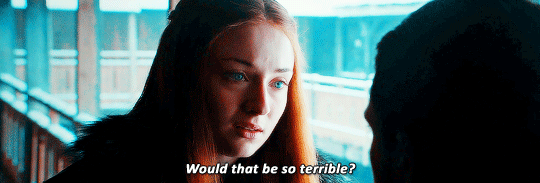
And Jon …
Sansa: He plays with people. He’sfar better at it than you. He’s been doing it all his life.
Jon: Aye? And what have I beendoing all my life? Playing with broomsticks?!?
Jon: When you question my decisionsin front of the other lords and ladies, you undermine me.
Sansa: Jofferey never let anyonequestion his decisions. Do you think he was a good king?
Jon: Do you think I’m Jofferey?!?
Notice how nothing they say toone another or do to one another is as bad as Yara calling baby Theona “dying pig”. And yet they can’t handle it. Even something as Sam gentlyattacking Jon saying that he “hates” him after Jon admits to being enviousof Robb would probably not work. I mean can you imagine Jon’s face if Sansa,even jokingly, told him she hated him. She’d be better off sticking a knife inhis neck. It would probably hurt less. :)))
The sexual component
Even though I noted that thescenes of Yara enjoying her sex life is a ham fisted way of reminding theaudience of Theon’s lack of sexual organs, I think it’s important to note thatTheon isn’t affected by the idea of Yara either having sex or beingromantically involved with someone.
That’s the kind of lack ofworry that Jon “If you touch my sister, I’ll kill you myself” Snow andSansa “do you think he wants to marry her?!?” Stark would probablyenvy.
And on that note, one of themost interesting things that denotes the differences between these two is how thetwo relationships start:
Yara and Theon’s relationshipstarts on a shared horse ride to Pyke, where Theon fondles Yara’s breasts andprivate parts all the way there only to be horrified when he realizes she’s hissister. Since then, their relationship has been completely platonic and neitherone of them has ever given any indication that they’d like to revisit thatparticular incident.
Jon and Sansa, on the otherhand, start off as long lost siblings who very quickly end up enacting marriageceremonies (the cloak), having passionate fights in tents, lingering foreheadkisses and … (to be continued in season 8). :))))
47 notes
·
View notes
Text
(you might say we are encouraged to love)
I received an ask requesting I make this response its own post in full (which of course I don’t mind doing!) so here it is:
An anon in the original post asked why, “Anakin/Vader is seen as interesting for women,” and that could be a bit of a loaded question, but I think there’s a definite rationale behind it. The way it was phrased made me think of a post I saw which addressed the fundamental split between Anakin and Vader as seen by certain audiences, why Anakin is treated by many derisively because there’s an element of the “heroine’s journey” that happens in relation to his arc and the struggles he goes through. It’s here and it’s really interesting in its entirety. “The constant barrage of degradation and trauma and unfairness of a system that benefits at your expense and refuses to validate you for it. And some of that he might have been able to reconcile by “growing up,” the same way a lot of us learn to come to terms with social fuckery, but Anakin doesn’t get the space to do that. He gets a giant bundle of unaddressed trauma and psychological issues and handed a kind of ambiguous destiny about needing to save the entire universe.” <- Imagine the burden of that, and they put it on a child and then give him zero structure to cope with it.
I’m also going to add this comment from that post because I think it’s worthwhile to note: if someone makes you angry and you show anger with your very own face you are weak, you have lost face, you have shown yourself vain and driven by a selfish, animal, irrational, feminine urge to defend yourself; but if you show anger without a face, if you show it unpersonally (the less it’s connected to direct accusation or a specific ill), especially in order to execute a role, then you suddenly appear to be the one in the position of strength, because you can no longer be directly accused of selfishness. The more you can cloak anger in the guise of necessity, the more you meet the societal expectation to be dispassionate, rational, always controlled - the more justification and legitimacy and power to you, even though this mode of anger is often more destructive than the first. This dynamic, assuming it exists as I’ve hypothesized it, is why I think Anakin codes as feminine to many, while Vader appeals to a certain masculine ideal.
Basically, the gist of it is that the emotional turmoil, the trauma, the way he’s exploited for his talents or what he can provide others, the way his agency is stripped repeatedly from him again and again tends to not be the way “male” hero journeys are told. It’s feminine coding (unfortunately) for those themes to be explored. For those emotions to be plumbed and portrayed with a substantive sense of sorrow and helplessness in the central male hero - it is not the “macho” standard. Why they thought they’d get a macho, unyielding masculine power trip from Anakin Skywalker remains a mystery to me, this is the same series where its original hero, Luke (who is his son! of course there were going to be essential parallels and contrasts between them), purposefully throws his weapon away and refuses to fight, and is characterized by his capacity for intrinsic compassion rather than any outer physical strength (even Han is much less of a “macho” guy than dudebros tend to make him out to be - not only because he’s unmistakably the person in distress who has to be rescued from capture in ROTJ, he has a lot of interesting facets that break down that ‘scoundrel’ stereotype, but I digress other than to say I love the OT, and the subtle distinctions in Luke, Leia, and Han that make them break the molds of expectation). SW fundamentally rejected toxic masculinity and the suppression of emotions from its inception, Luke’s loving triumph and role as redeemer only happens because he refuses to listen when he’s told to give up on his friends or on his belief that there’s good in his father, his softness is his ultimate strength. Anakin was never going to be some epitome of tough masculinity, and George Lucas knew exactly what he was doing crafting him in that way. The audiences who wanted Bad Seed Anakin from the beginning didn’t know how to reconcile this sensitive, kind-hearted, exceedingly bright kid, with their spawn of the Dark Side notions, and I think, unfortunately, far too many then either rejected him completely or refused to understand what the central points in his characterization are about.
The fact that this narratively would have made no sense (if Anakin had been “born bad,” then there would have been no miraculously surviving glimpse of light for Luke to save - I’ve said this before, but imagine how profoundly essential to his true self that goodness had to be for it to even exist any more at that point, after all he’d suffered, after all he’d done. the OT tells us more than once what a good man Anakin Skywalker was, it’s part of what makes the father reveal as powerful as it is - if we hadn’t heard the fragments of stories about Luke’s father, it wouldn’t be nearly as shocking, but we KNOW he was a hero, an admirable man, a good friend). I can’t fathom how tricky telling the prequels had to have been to that extent - the audience knows what will happen in the end, it’s a foregone conclusion, we know he will fall, we know Vader will be created, we know the Empire will rise (though that would have happened even if Anakin had remained in the light, which is a whole other discussion). So the question became, who is this person? What influenced him? What shaped his destiny? And that ended up being a far more complex and morally fraught and stirringly emotional story than just “badass Jedi becomes badass Sith lord.”
That talented, highly intelligent boy is taken in by the Jedi after he has already developed independent thought and very intricate emotional dimension - the argument that he’s “too old” to be trained is because he’s not malleable enough to be indoctrinated the way Jedi usually treat the children they take. They may blame this on his attachment to Shmi, but she’s not the problem (if anything, had they not been so unfeeling and rigid, and had they freed her and allowed her to at least stay in contact with her son while he was training because it was a special case - they’re the ones who stick that “Chosen One” mantle on him, you’re telling me they couldn’t make an exception? but no, because they put that weight on him and then never help him carry it and constantly undermine it and question and mistrust him - Anakin would have been stronger in his training, and he would never have fallen to the Dark Side at all. There are so many moments, over and over, where his fall could have been averted, and everyone fails him to the bitter end, when he fails himself).
And so he is traumatized, due to years of abuse and difficulties as a slave, due to having to leave his mother behind because the Jedi would not free her, due to being told to repress his emotions over and over again when he is, at his core, an intuitive and perceptively empathetic person (he wants to uphold that central tenet of his training - “compassion, which I would define as unconditional love, is central to a Jedi’s life”), yet he’s made to feel he is broken/wrong/constantly insufficient. He’s wounded by abandonment issues and lack of validation and the human connection/affection he craved, and he develops an (understandable) angry streak, he’s socially awkward due to the specific constraints/isolation of a Jedi’s life and due to the fact that they tried to stamp out what made him uniquely himself, which makes him continually conflicted with a never-ending pulse of anxiety (see absolutely ANY moment where he breaks down emotionally, and you’ll see him say something to the effect of “I’m a Jedi, I know I’m better than than this,” “I’m a Jedi, I’m not supposed to want [whatever very basic human thing he wants, because they make him feel like he can’t even ask for or accept scraps of decency]” - they fracture his sense of his own humanity, Padme tries to validate those feelings but that Code is a constant stumbling block in his mind). He is troubled by fear and the constant press of grief (I would argue he has PTSD at the very least), and all around he’s met by mistrust and sabotage.
Male heroes shouldn’t be treated as infallible in their own narratives (none of them are that, as no character of whatever gender/origin is, as none of us are), but at the very least we usually see them treated with respect by others. Anakin often gets no such luxury. He’s treated the way we frequently see women treated, and that treatment comes from the same rotten core - the idea that emotions are weak, that expressing them makes you lesser, that crying is a sign of deficiency, that fragility of any kind cannot be tolerated. Anakin is even the hopeless romantic in this situation - Padme, while gracious and warmhearted, is much more pragmatic and tries to reason her way out of her blossoming love for him until she’s of the belief that it doesn’t matter anyway because they’re about to die, and she wants him to know the truth before they do. (I’d also like to note that the closest people to him all speak their love aloud when they’re at the point of death - Shmi when he finds her bound and tortured with the Tuskens, Padme in the Arena, Obi-Wan watching him burn on Mustafar, and how unbearably sad is that? even though his mother had said it before, even though he got to hear it many times again from Padme - and it’s her last entreaty to him - we shouldn’t be pushed to the brink of death to express it). Anakin is the one gazing at her dreamily and tearing up about it and professing earnest, dramatic love in front of the fireplace (idc what anyone says about the dialogue, the way he expresses himself is entirely sincere, it’s the rawness of that sincerity that I think makes people uncomfortable bc it’s unexpected), she’s the one who talks about living in reality. She, too, has been taught to guard and temper her emotions from her time as a child queen and the years she’s spent navigating the murky political waters of the Senate, but she’s become adept at it, unlike Anakin. If anything, they’re the only person the other has with whom they can be truly genuine and unafraid of exposing the recesses of their hearts, they’re the only safe place the other has, it’s no wonder they give themselves over to that, and the fact that they do is beautiful, it’s not wrong (which I have more cohesive thoughts on here and it was the underlying thesis of my heart poured into the super long playlist for them too /linking all the things). They see the joy and spirit in the other that no one else ever sees, and they make a home there.
Anakin becomes an esteemed general not only because he’s awesome in battle and strong in the Force and a gifted pilot and a skilled leader (all of which are true), but because he shows those around him respect, and great care. So, yet again, there’s a subversion of what might have been expected. No one is expendable to him. He views the Clone troops as individual human beings. He mourns their losses (many of the Jedi, with their no attachments rhetoric, allow the Clones to be used without much hesitation or thought for their status as sentient beings born and bred and programmed to die in war, but Anakin was a slave. He comprehends their status more than anyone else could). Anakin is a celebrated hero to the public, and in private is being chewed up by fear and uncertainty. Anakin is devoted to and completely in love with his wife, but has to keep it a secret. Anakin still craves freedom that even being a Jedi has not afforded him, because of their rigor. Anakin still desperately has to scrape for even the bare minimum of approval from the authority figures around him - even his closest mentor and friend, Obi-Wan, while they are irrevocably bonded and care for each other in a myriad of important ways, often doesn’t understand him and dismisses his feelings, refuses to advocate for/stand up for him when he needs it, or tells him to calm down. I’m surprised they never tell him he’s being hysterical when he gets upset, but the connotation of being told to “calm down” when angry or sorrowful or frustrated is something most women can identify with all too well. His desperate desire to protect Padme as everything begins to curl and smoke and turn to ash around him has a very clear nurturing aspect to it underneath the layers of terror and frustration and building paranoia - all he really wants is to be able to protect and care for his family, all he hopes is to save them and have a life with them away from all the war and the political in-fighting and the stifling Order. He’d quit right that second but he needs help due to his nightmares, and no one is willing to give it to him. (Except, ostensibly, Palpatine, who has been grooming him and deftly manipulating him and warping his perceptions since he was a child, all under the guise of magnanimous, almost paternal, care. Palpatine is brilliant in his machinations, perfectly cunning in his evil. He knows exactly how to slip in and break people, and he plays Anakin to the furthest extreme. I’m not saying Anakin doesn’t have choices, he does, and he makes the worst possible ones, but Palpatine pulls the strings in a way that makes him feel that he has no agency - and in truth, he does have very little agency throughout every step of his arc, marrying Padme and loving her in spite of the rules is one of the only independent choices he ever makes that isn’t an order, a demand, a fulfilling of duty - and Palpatine poises himself as the answer to all the problems, if Anakin does as he’s told. He’s been hard-wired to take orders for too long. He is so damaged by this point, and so distrusting - Hayden said something once about how Anakin is still very naive in ROTS, even after what he’s been through in the war, he’s still so young and unknowing about many things, and then his naivete is shattered by complete and utter disillusionment, and that shock is terrible and incomprehensible for him, so he clings to the one source of power he’s given, and it’s catastrophic). He is haunted by grief and impeded by fear of loss, and it drags him into an abyss. We watch all of this happen with bated breath, we see everyone fail him, we see every moment where he could have been helped, we see every path he could take if only he had the ability to stand up for himself and had been given the tools to cope with his psychological and emotional baggage, we see that he very nearly turns back, up until the death knell at the end. We know it’s coming from the moment they land on Tatooine and meet him and decide to make him a Jedi. We know, and we still hope for it to turn out differently. We know, and it still breaks our hearts.
I don’t want to make blanket statements about typical male viewers vs. typical female viewers, that’s too dismissive of a stance to take, but on a seemingly wider scale, I don’t think many of the former (especially the ones who were either older fans or who were teenagers themselves at the time) were as interested in political nuance and a tale of abiding love and a young man burdened with more than should ever have been put on his shoulders. Since the question was basically “why does he appeal to women,” (and not just cishet women) I imagine that the answer to that varies greatly depending on any one perceptive outlook, but has a similar core in each case of us wishing we could help change the outcome, even though we know we can’t, and of wanting to understand his actions and his pain, wanting to see his positive choices and his goodness validated, wanting to see him learn healthy strategies, wanting to see his love flourish, wanting to see him freed from the shackles he drags with him, from childhood to Jedi to Vader. The crush of the standards of society and expectation on him may speak to many. He is never liberated (until his final moments of free breath). His choices are either taken or horrifically tainted. His voice is drowned out by those more powerful around him. His talents and intelligence go largely unrecognized. His good, expansive heart is treated like a hindrance. The depth of his empathy and love is underestimated - and that, in the end, is important, because that underestimation, ending with Palpatine, becomes the Dark Side’s ultimate downfall and undoing. Vader may literally pick up an electric Palpatine and throw him down a reactor shaft, but that physical action is the final answer to a much more complete emotional and spiritual journey. He throws him down and the chains go with the slave master, and for the first time, certainly since before he lost Padme, his heart is unfettered, his love is reciprocated, and he is offered a true voice, a moment of his true self, a sliver of forgiveness, before being embraced again by the transcendence of the light. It is his act of rebellion, it is his own personal revolution, his final blow in the war. The entirety of the arc hinges upon him in that moment, Luke has been valorous and immeasurably valuable, but he’s done all he can do - the final choice is Anakin’s (and it’s such an interesting case because where else have we ever been able to fear and appreciate a villain, and then totally transform and re-contextualize him?). He is in that moment, indeed, the Chosen One.
All these facets are fascinating to watch unfold if you’re willing to be open-minded and heartfelt and sympathetic to the journey, if you’re willing to dig into the complex depth of his pathos.
I remember seeing AOTC as a teenager, and my love was Padme, she was where I was invested, I identified with her, I loved her kindness and her bravery and her sense of honor and justice, I loved that her femininity did not in any way diminish her and was an asset, I loved that, while she takes charge and has the fortitude to rush headlong to the rescue, while she can fight and tote a gun and blast a droid army as well as anyone, her superpowers are her intellect and her giving heart and gentle spirit. I totally get why Anakin holds onto the thread of hope she gives to him for all of those years, and why he falls in love with her as he does, but since I felt a lot of the story through her eyes, I understood why she was drawn to and fell in love with him, too. He’s dynamic and a bit reckless, he’s courageous, but he’s vulnerable and needs support, he’s deeply troubled but also radiantly ebullient at times (the scene in the meadow where she’s so touched by the carefree joy he exhibits, how it delights her and takes her aback, because she’s almost forgotten what it is to feel that, she’s almost forgotten other people could, and here he is, warm and teasing and spirited), he is often guileless, especially with her, he’s fervent and loving in a way she’s never seen or experienced, and that love is given with abandon to her. Who…wouldn’t fall in love with that? It’s a gravitational pull. AOTC impacted me in certain other personal ways as well, I was trying to understand some nascent hollows of grief (Anakin losing his mother as he does was very affecting and heartwrenching for me, at the time I’d lost my grandfather to whom I was quite close, and I’m also really close to my own mom, so his woe had an echo to me), but that vision that I specifically had of their love, the way I interpreted it (which I may not have had words for at the time, but I certainly had the emotional response) was a dear and formative thing.
I talked about this here, but to rephrase/reiterate, by the time ROTS came out, my life had shifted completely on its axis. I was still young, but my much dreamier teenage self was being beaten down and consumed by illness, and I was angry. Anger is not a natural emotion for me (guilt and self-blame tend to be where I bury anger), and I really didn’t know what to do with it. Everything felt unfair and uncertain, like there was no ground at all to stand on. I hurt all the time, literally and figuratively, I was in constant pain. I was lonely and frightened and sleep deprived and often had nightmares (this is still kind of true lol, as is the physical pain part). Padme was still my heart and touchstone - as she remains so to this day in this story - but suddenly I understood Anakin in a much more profound way, one I’ve held onto because he’s important to me and I love him. I felt his rage, his anguish, his desire to do something, anything, to somehow change or influence the situation, to rectify his nightmares, to cling to whatever might make a difference, might save him from being drowned in the dark and from losing everything that made him who he was as a person. Seeing him try and knowing he would fail was devastating, but also…relatable, in an abstract way (obviously not the violent parts, but thematically, I felt some measure of what it was to scramble up a foundation that is disappearing beneath you, that your expectations and dreams of what your life would be can vanish in disintegrating increments). All I wanted was for someone to help rescue him, because all I wanted was for someone to help rescue me. All I wanted was the hope that things could turn around - and there is hope in ROTS, despite the unending terror and tragedy, it’s never entirely gone, because Star Wars exists as a universe with the blazing stars of hope and love ever ignited at its center - but still, it was a very personally rooted emotional exploration for me, and I only started to deal with my own floundering anger when I saw how it might consume the true and loving and softer parts of me if I didn’t hold it back. (A few years later, I went through this again in an even worse way, and the source of that rage and despair was someone I cared for, and once I got through the worst bleak ugliness of it, there were a couple of stories I returned to in an attempt to gain newfound solace and comprehension, and Anakin and Padme were in there. My compassionate, hopeful heart was being torn by that fury, and I clawed my way back up from the brink of it because I knew I could die, not even necessarily figuratively, it was…a bad time, if I didn’t find my way out. Anakin’s story is a tragedy and a fable and a kind of warning - we should not deny or suppress our emotions or our authenticity, but we also cannot let it destroy us - and then ultimately his lesson is restorative, too, that we never lose the essential part of our souls, that we must allow ourselves to feel. Balance indeed).
As consistent and transparent as my love for Padme has always been, my Anakin emotions are actually so close and personal that I intentionally avoided ever exposing them for actual years, it’s like…basically in the past month that I’ve ever been truly honest about it on Tumblr, because exposing that felt like too much, but I don’t really care about keeping it quiet any more, and that’s very cathartic.
I myself am an incredibly emotional person, and I don’t believe that Anakin’s emotions are negative qualities, which I meant to underscore. In fact, his open emotions are an exquisite part of him, and it’s the Jedi who are wrong for trying to stamp that out, when his emotional abilities are part of what define him in his inherent goodness and his intellect and strength. He has an undying heart. For he and Luke both to stand as male heroes who represent such depth of feeling is really special, and vital to the story. Anakin is the most acutely human character in many respects, in his foibles and his inner strengths, in his losses and his longings and his ultimate return to his true self - that’s why we feel for him, that’s why we ache and fear for him, that’s why we rejoice for him in the end.
Other people could speak to the Vader part of it much better than I can, Vader’s an amazing and very interesting villain (the fact that, as Vader, Anakin is much more adhered to the Jedi code and way of thinking than he ever was as an actual Jedi, for example - he has an order to him, he is much more dispassionate, he is very adamant about the power of the Force - is endlessly intriguing, because he’s such a contradiction). I use this term for a different character, but I’m going to apply it here - Anakin is a poem of opposites. He is a center that can serve as either sun or black hole. He is a manifestation of love and light and heroism, he is a figure of imposing power and cold rage. He’s the meadow and the volcano. The question then becomes, how expansive are we? When we’re filled with the contradicting aspects of ourselves, how do we make them whole without falling apart? When we do fail, can we ever do anything to fix it? And the answers again will vary by individual, but to my mind - we’re infinite, and thus infinitely capable of, at any point, embracing our light, even if we’ve forgotten to have faith in it, and while we may not be able to fix every mistake or right every wrong, we can make a better choice and alter the path. The smallest of our actions can ripple and extend and are more incandescent than we know. That’s what he does, against all expectation. In the end, he is an archetype not only of a hero (be that fallen or chosen or divine), but of a wayward traveler come home, a heart rekindled, a soul set free to emerge victorious in the transcendent light.
In the final resonance of that story for me personally, I love him for being a representation of that journey, that no matter how long it takes to get there, how arduous it is - that things we lose can be found again, that with the decided act of compassion, pure, redemptive love can be held onto, that the light persists and that, even when it flickers most dimly, refuses to be extinguished, and can at any point illuminate not only ourselves, but can shine brightly enough to match the stars in the universe.
I hope this is at all cogent, here’s a gif for your patience ♥

#anakin skywalker#darth vader#sw meta#star wars#okay to reblog#(of course! <3)#this is so long i'm so sorry for anyone who's now seen it twice but i didn't want to ignore the very sweet message i got#(which i am honored by thank you for even asking and caring and being patient enough to read this spiel omg)#i tweaked some of the wording for clarity (i changed it in the original too) but otherwise it's basically the same#bubble wrap around my heart#*#encouraged to love#anyway i love him#and i love luke so much and that's a vital component here#luke's faith and kindness and important heroism exists for a reason#luke sees the truth and the good and he doesn't let it go and his spirit does not waver and is brightly right in the end#don't you dare try to tell me anakin wasn't always fundamentally good in the truest and most luminous parts of his heart#to do so is to not only undermine anakin but to invalidate luke and padme and i won't stand for that#i could write one of these for luke but i think he's getting really good defense from sharper minds than mine in many cases#i could write one of these for padme but she's also been getting quality recognition lately#so as far as any defense goes this is the best my exhausted little brain can do and i hope it does justice to the story in some small way#i'm so ill and out of it that i have no idea if this makes sense even after copy/pasting it and fixing it up but itried.jpg#long post for ts
246 notes
·
View notes
Text
Validation
I woke last night because my mind was brought to a question, “have you ever had non-consensual sex?” Like… what the hell? I’m trying to sleep! But my brain identifies with that question because my therapist brought a question to my head when she asked me, “Was there ever a time you felt physically powerless?” She asked me this because I mentioned how working out is something I find really helpful to my overall health.
My mind went to a place of a different trauma, but I was confused… and I sort of invalidated that thought and saying “no, I had some power, but chose not to do anything.” And I quickly dismissed the thought… and I’m now realizing I gaslight myself…. I did however bring up something a little different, the earliest time in my life I felt powerless was more of a mental state, when I was around 5 yrs old. But I won’t bring that up right now, because I already talked about it to my therapist.. I sort of want to address this earlier issue or question that stole my sleep last night. My therapist told me to journal my negative thoughts, which is why I’ve been writing more frequently lately.
I dated a female once who traumatized me in multiple ways, I always chocked it up to one particular thing and telling myself, “we only dated for 4-5 months, it wasn’t that big of a deal.” But that thought is me, invalidating my own feelings (gaslighting I think it’s called). Or that thought isn’t exactly me, but how my mom used to treat me as a kid, being unbelievable or faking things to get what I want, in her opinion. My mom blaming me as a kid for something I needed protection from, I needed a defender, and I didn’t get one, so I have this problem where I invalidate my own feelings a lot.
So this person, my ex, in the early stages of our relationship, we went on a date that didn’t go as planned. She and I ended up getting really drunk. She worked for a golf course as a caddie girl, and she worked the bar/restaurant occasionally. She was good friends with the bartender. I was waiting for her to get through her shift so we could go to the movies. She told the bartender to treat me to some drinks. He knew I wasn’t 21, but he wanted me to try some shots he was experimenting with. I took the bus to see her, because I my motorcycle was in the shop at the time, so I was ok with drinking, I wasn’t driving back home anyway. But he kept giving me more and more shots, and I honestly can’t remember how many I took or how long I was there for.
Later that day, skipping the movie, she after a long day of drinking, her parents picked us up and took us to their home. They could tell we were drinking. They got upset with her because apparently she was taking medication I didn’t know about, and she wasn’t supposed to be drinking while on it. They had an argument, but they allowed me to stay the night because I lived really far.
This was all before I knew she was diagnosed with Borderline Personality Disorder. I had such a hard time from so much drinking setting my alarm to wake up at 3am to take the bus back home to shower and go to work. I started work at 6:30am, I lived pretty far and the bus takes forever. So her mom helped me set my alarm on my phone. It was quite embarrassing. She was a stern, strict, hard lady, but at least she did that for me.
I didn’t get much sleep that night because my ex wanted to have sex. Me, being so intoxicated and tired, and unable to really move… I even verbally told her “no.” I physically tried to push her off of me, but my body wasn’t responding… I’ve never felt so physically powerless in my life… and yet my brain still tells me it’s my own fault… and maybe it is… a part of me still believes it because I chose to drink… I chose to stay the night… and I chose to stay in the relationship after that… gaslighting myself by saying, “well, she was your girlfriend, so how can it be rape? Well, she didn’t drug you herself, how can it be rape? Well, you chose to be there, it’s your fault. Well, you chose to drink, it’s your fault. Well, she was intoxicated too and she didn’t know what she was doing so you can’t hold her accountable. It’s only rape if you choose to call it rape.” These are all thoughts that are false, and they hang out inside my brain… rape is rape now matter how you dress it.
She messed me up a lot… and maybe it’s something I should bring up to my therapist. I’ve been trying to address earlier things in my life that need addressing, but this is something I sort of put in a box that’s more recent. This happened when I was 20. It’s been 8 years since then, which is insane to me that I still consider it recent.
She was the beginning of a domino effect that set me off towards giving up on dating women. That’s about the time I began to exercise like crazy, I ran a lot, I wanted the confidence back that she stole from me… whatever confidence I had left that she stole… whatever I had to begin with which wasn’t much at all… I wanted my power back… I tried dating other women after her, but I started becoming cold… I would date a girl… and get really angry and easily irritated… I began self-sabotaging healthy relationships, and the toxic ones I sort of gravitated to… and I became self aware of it. Once I became self aware of my own behavior, I decided to give up on dating women for a time.
I became a member of a church I felt loved and accepted in. I found some form of peace and a different form of self-confidence spiritually. I felt at peace with being single forever… but I felt open to dating men and getting to know a new chapter of my life that I wanted to start, and a chapter I wanted to end. I wanted to end the chapter that involved dating women. At least, I knew that’s what I would have to do if I wanted to be a member of this church this new home. I felt willing and ready.
Then another female showed up to church, another toxic relationship that I was drawn to, and tried to deny, but it was so hard. We became really close friends in the process, but she was head over heels for me and it didn’t work out… which is another box I may have to open later… she threatened to kill herself if I said “no” to being her girlfriend… and I put my foot down, and told her I’m sorry, but I can’t say “yes.” I didn’t want to give up my standing and my belonging to the church which she was also a part of…. And she took a bunch of pills in front of me. I tried smacking the pill bottle out of her hand, and some fell in the sink, but she took a whole half of an entire pill bottle. Also medication she was on for her mental health, and she had a previous addiction to pill popping… so I called the police for an ambulance… she thought she was gonna die in my arms, but I laid there with her while waiting for the paramedics to come take her to the hospital to flush her system. She was SO angry with me after she came to the following week in the hospital when I went to visit her…. She was so mean to me…
I’ll save that for another journal though… just needed to validate myself where I noticed I wasn’t.
0 notes
Text
Experience Examined In Between Lines of Poetry
By Jacqueline Thom
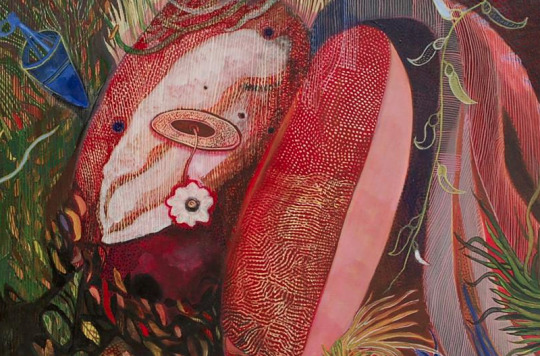
Experience is a difficult concept to bring to life on paper. It requires the act of being able to sit with oneself and consider all the elements that make an encounter so vivid that it stays in the mind, transforming an event into memory into experience, that which is so powerful, it alters how one feels, in the moment and afterwards. Bringing that emotion to life in an authentic way was important for Tarfia Faizullah in writing her poetry collection, Seam. She chose not to go the same route many of her contemporaries might follow — heavily researching an experience before attempting to conjure the mindset that can accurately replicate it; instead, she traveled to Bangladesh where she spoke with birangona, female survivors of the 1971 Liberation War, which saw many women and girls raped, tortured, and traumatized by the Pakistani Army that captured them. Faizullah adds a valuable addition to the New Historicism school with her attention to truth and validating the ordeals of women long shunned by their own communities, and changes how experience is renewed and reexamined on paper in her book.
Faizullah’s ties to her culture is evident in how devoted to its exploration she is in her work. As a Bangladeshi American, she is privy to two cultures, but strives to stay away from the western narrative, instead choosing to come to terms with the duality of being a person of color in America, and then just another Bangladeshi in her ancestral country. Her poem, Self-Portrait as Mango, angrily retorts to “How long have you been in our country?” with “Suck on a mango, bitch, that’s all you think I eat anyway…This mango was cut down by a scythe that beheads soldiers, mango / that taunts and suns itself into a hard-palmed fist only a few months / per year, fattens while blood stains green ponds.” (Faizullah 23). Faizullah ironically calls herself a mango and articulates that what is a simple object to one person holds generations of history for another. While the mango ripens, it is witness to war and violence, but still grows until the day it is properly eaten (sucked open with teeth), or analogously, truly appreciated for the history it holds. Self-Portrait as Mango represents Faizullah’s tone as a poet; she is confused at her status as an other in America, she is angry when her validity is questioned, and yet she is indignant with the knowledge that her heritage has a rich history that rises far above any of these challenges to her identity.
This style is evident in Faizullah’s notes to herself in Seam. While she takes on an appropriately modest tone when addressing the birangona and emulating them, there is still that reverence for a past yet undiscovered by her. Such is true of Interview with a Birangona as she takes time to self-reflect in third person on her findings of the women’s experiences: “You listen to the percussion / of monsoon season’s wet / wail, write in your notebook / bhalo-me, karap-me / chotto-sundori— / badgirl, goodgirl, littlebeauty—in Bangla / there are words / for every kind of woman / but a raped one” (29). Not only is Faizullah questioning her culture’s inability to accommodate raped women, but she does so in a melancholic rather than accusing tone. She asks readers to consider why there is no infrastructure in place to support the birangona, or at least educate the communities about the long-term damage sexual assault has on victims. Her thoughts are expanded further in other poems where Faizullah suddenly becomes mournful and almost separated from what she is talking about as she emulates the birangona’s distanced retellings of their own traumatized encounters in the camps they were brought to. She tells readers, “my body became an eddy, / a blackblue swirl. Don’t cry, he says. How when the time / came for his choosing, we all gave in for tea, a mango, / overripe. Another chance to hear the river’s gray lull.” (34) Faizullah becomes much more metaphorical and perhaps even more poetic when she takes on the birangona perspective, a way of speaking that is common for victims of trauma to distance themselves from what happened. In turn, Faizullah’s dialogue and that of the birangona is distinguished from the much harsher, violent language of the rapists. All this works to create an eerie conglomeration of memories retold into an experience that shocks readers into the women’s awful realities as slaves to a traumatic past and their scapegoated present. What is presented in Seam becomes another experience on its own, for readers who have not had to witness the same kind of violence that is described, for Faizullah, as the child of parents scarred by the liberation war, and for the women who had to put their trauma into words for us to understand even an inkling of what they felt. Seam then reconfigures how we think about the representation of experience for all involved in its depiction, for without the multiplicity of historical perspectives, and then Faizullah’s own influences as a person of color in two very distinct worlds that perceive her identity differently, we would not have the same ability to experience so deeply as we did with this book, where no aspect of the memories and thoughts we read about feels unexamined and unfelt.
The way in which Faizullah truthfully pursues the telling of experiences in her poetry is a valuable contribution to the New Historicism literary theory. She does not merely try to grasp on her own what it is like to be a birangona, but seeks inspiration from the very women who know what it is like. Writer Kristina Marie Darling of Tupelo Quarterly puts Faizullah’s writing as “tragedy turn[ed] to narrative and set[ting] other pains into motion, be it grief or a desire for some form of justice. Faizullah also documents the stories in compact ways, choosing the most potent images and details to render heartbreaking devastation, and then moves to a larger, almost prophetic, question that forces readers to confront the senselessness of such a death” (2015). In other words, Faizullah’s cultural connection to the events she speaks about, and her willingness to strengthen that connection, is what allows her to translate words said by women likely desensitized to their own trauma if only to be able to bear it, in a way that resonates with readers and forces them to consider the needless violence of the war. New Historicism itself is a cultural study that strives to reconnect a work with the time period it is produced in or influenced by. It is not just a matter of what happened, but a matter of interpretation of the historical events themselves. With this examination of historical literacy in mind, Faizullah casts a telling light on how exactly birangona have been treated since they survived the war. She laments on their being shunned by communities for their ‘dirtiness,’ despite the total lack of control these women had in their circumstances. She asks readers to consider the women’s self-inflicted guilt over the futility of their situation and the guilt added on by their families and neighbors, and how that increases birangonas’ trauma. There are words for every kind of woman but a raped one. By asking these questions, Faizullah attempts to further enhance the contextual analytical methods of New Historicism by juxtaposing the circumstantial with the emotional.
In showing readers the lack of respect for these survivors, Faizullah ultimately addresses how we need to interpret events — as experiences that affect our own and should be treated as such. Seam does not just ask what happened, but it confronts violent experiences with a forwardness that shocks readers into sympathizing with victims and considering what can be done to right the wrongs of history and prevent another mass traumatic event from occurring. We are stirred into thought and action by the poetry’s historic validity, and Faizullah’s own willingness to be meta. While traveling to Bangladesh to interview the birangona, she notes, “I take my place among / this damp, dark horde of men / and women who look like me— / because I look like them— / because I am ashamed / of their bodies that reek so unabashedly of body— / because I am / an American, a star / of the blood on the surface of muscle” (12). She is different, a misdiagnosed ‘other’ in America, but as soon as she is in her country of origin, Faizullah emphasizes feeling strangely more American than before despite mingling with those who look like her…startlingly too much like her. That familiarity and lack of it at the same time is another influence in the way she is able to convey her sincerity and truthfulness as a narrator for the birangona in her poems. There is an acknowledgement of disconnect, but a drive to bridge that gap by finding the truth buried underneath cultural stigma and old historicism’s failure to interpret experience according to person and place in time.
Through Seam, Tarfia Faizullah contributes an entirely new way of recording the human experience for those who witnessed it in the past and alternately those who learn about it in the future. What is produced is a vivid re-narration of experience that is able to explore both the feelings felt by those involved in such encounters, while also questioning the supposed objectivity of previous historical interpretation methods. Faizullah posits that it is impossible to approach history without a subjective lens, and we are all the better for it, for only then can we truly understand the emotions that drive human action. Faizullah takes New Historicism head on with Seam, and fearlessly confronts the context from which her subjects’ stories were violently created so that readers may understand how their own experiences are subconsciously affected by the past.
Works Cited
Darling, Kristina Marie. “Seam by Tarfia Faizullah.” Tupelo Quarterly, 2015, https://www.tupeloquarterly.com/seam-by-tarfia-faizullah/.
Edwards, Trista. Review of Seam, written by Tarfia Faizullah. American Literary Review. University of North Texas. 2014.
Faizullah, Tarfia. Registers of Illuminated Villages: Poems. Graywolf Press, 2018.
Faizullah, Tarfia. Seam. Crab Orchard Review & Southern Illinois University Press, 2014.
“New Historicism, Cultural Studies (1980s-Present).” Purdue Online Writing Lab, Purdue University,
https://owl.purdue.edu/owl/subject_specific_writing/writing_in_literature/literary_theory_and_schools_of_criticism/new_historicism_cultural_studies.html.
Acknowledgements
I would like to thank Caitlin McGill for her profound patience and support when I wrote this during a time of much personal unrest and dissatisfaction. I learned so much in the few short weeks we had together.
0 notes
Text
Word Vomit Wednesday - 30 Things About Being 30
Welcome to Word Vomit Wednesday! A series of blog posts about a specific topic from current events that I, and sometimes the rest of the Internet, ruminate obsessively about. All thoughts/opinions/experiences are my own; I don’t claim anything that I write to represent anyone other than myself.
Hello lovely people! Today’s WVW will be a departure from the usual content because 1) it’s suuuuuper late (I meant to post last week and not this week) and 2) I turned 30 last week (hence why I did not post)! To commemorate this new decade and because we live in the Buzzfeed era, I’ve decided to do some personal reflection and make a list of 30 of some of the more important things I have learned up to this point. Some lessons took a very long time to sink in, some I had to learn quickly and unexpectedly, and some I’ve always had with me. In no particular order, here they are:
1. If you say you’re going to do something, do the best you can. You’re allowed to take your time. You’re allowed to change your mind. It doesn’t mean you’re a bad or flaky person if you’re not always able to follow through.
2. Manage your damage. You deserve healing and people in your life who recognize you as human instead of punish you for it. It is the hardest, least selfish, and most rewarding work you will ever do. Give yourself that gift.
3. You have a lot to offer. Don’t feel pressured to only give what people may want of you, but figure out how and what you want to contribute on terms that make sense for you.
4. The most important relationship you have is with yourself. As cliched and overly-simplistic as this statement is, it’s also true. No one is going to be with you as much or as long as you will be with yourself. Figuring out how to be the best you for you makes things feel a lot easier and can even help make approaching your other relationships more manageable.
5. It’s ok to be vulnerable and it’s imperative to be selective about who to be vulnerable to. Feeling vulnerable is all about feeling safe and can also very much be about context. Not everyone can or should be entrusted with your heart and your experiences, so paying close attention to picking up on who is safe and who isn’t is an important skill to develop. Which brings us to...
6. Listen to your body. For pain, red flags, pleasure. You may not understand exactly what your body is telling you in the moment, but it’s important. We get so many messages about how we should be and what we could be doing. While a lot of this messaging is meant to help us to be our “best selves” all it really ends up doing is making us distrustful of our own experiences, instincts, and intuition regarding what is actually best for us.
7. Trust yourself.
8. People will treat you like shit. Sometimes it’s systemic based on who you are and other times hurt people hurt people. Either way, dump those people and situations. They will only hold you back.
9. It’s ok to be angry and to show it. In some circumstances it’s absolutely necessary. Anger and rage are basic human emotions and are not indications of the kind of person one is, but who would know that based on how our relationship to anger is so fucked up in our society. Women aren’t allowed to express it and men are expected to express it frequently and violently neither of which are healthy for individuals or the community at large. Healthy relationships to our anger (and other emotions) can let us know when a boundary is crossed and can give us the energy necessary to assert ourselves.
10. Be curious. Ask anything and everything. The less mysterious the world is, the less fear is controlling the steering wheel in our lives.
11. If you can, travel as much as possible. You’ll learn things about the world and about yourself by getting out of your comfort zone. Sometimes, just going out in your own backyard can be enough of an inspiration or adventure.
12. Stop feeling bad for wanting and needing things. Toughing shit out just because that’s what we’re told to do is terrible advice. All you’re doing is suppressing important information about yourself.
13. Friends will come and go, and with them many gifts and insights into different moments from your life.
14. There is nothing wrong with you. Even if you’re suffering, it may not have anything to do with who you are or anything you have done.
15. There might be something wrong with you. Sometimes if you’re suffering there might be an underlying condition that warrants investigation.
16. Take your medical health into your own hands. Don’t settle for medical professionals who don’t actually help you find the answers and treatment you need and also make you feel like shit about it. Your health is more important than their God-complex.
17. Things that once held the most importance to you may change due to unexpected circumstances. Embrace the change and reevaluate your priorities by putting yourself first.
18. Mourn the person and dreams you thought you would be and have accomplished by this point. Just because things didn’t come to fruition the way you once imagined they would, doesn’t mean those dreams were stupid or a failure. Those parts of you and the space they occupied deserve to be honored.
19. Throw societal expectations out the window and learn about who you are instead. The world, and you, will benefit more from showing up as your authentic self than what you think the world wants you to be.
20. It’s none of your business what other people think of you.
21. Use your privilege to make space for other marginalized voices and allow others to make space for you to use yours. But, and depending on what space is being occupied, don’t wait to be invited to use your voice.
22. You will face very difficult and sometimes traumatic situations in your life. You may struggle with decisions in the moment or for years afterward, but there is no right solution. There is only what will be the healthiest for you, sometimes on a moment to moment basis.
23. Ask for help. As a being that is human, you have limits. It’s ok to know what those are and ask for assistance. No one expects you to be able to do everything yourself and if you find yourself surrounded by people who do, you may not be surrounded by the healthiest people and/or you’ve somehow infiltrated a robot army. So, back away s l o w l y.
24. Spend time with the people who are most important to you. This seems like a no-brainer but can often feel like a huge challenge. We come up with all kinds of excuses not to be together: too much work, not enough money, who will watch my cat, etc. Sometimes we really can’t get away, but a lot of times we just need to get off the grind.
25. VOTE AND CALL YOUR REPRESENTATIVES
26. You may have people you admire and works of art that you love for all kinds of reasons. Creativity can unite us, help us empathize with one another, and speak truth to power. Once a person wakes up to the power structures that affect and oppress us in daily life, they will also realize that no matter how much joy someone, a song, or a film can bring, it does not mean that it may not be problematic AF too.
27. Allow life to happen, but not too much. Be more proactive in your own life lest you get too swept away in other people’s decisions.
28. Figure out your boundaries and set them. If others don’t respect them, that’s a reflection of them not you. And take that as a cue to dump those people as fast as possible. You can’t change anyone so don’t continue to kowtow to people who think your feelings/needs are not as valid as theirs.
29. People will surprise you. Just as you are changing, so is everyone around you. Sometimes these surprises will hurt and other times they will move you to the happiest tears.
30. Allow yourself to acknowledge all the good things in your life, everything you’ve accomplished, and the love you get from others. It’s ok to accept and be recognized for your awesomeness without deflecting or self-deprecating. Because you’re great, no excuses needed!
Katie Louchheim could not be offered enough money to EVER want to relive her 20s. She has a feeling the best is yet to come.
1 note
·
View note